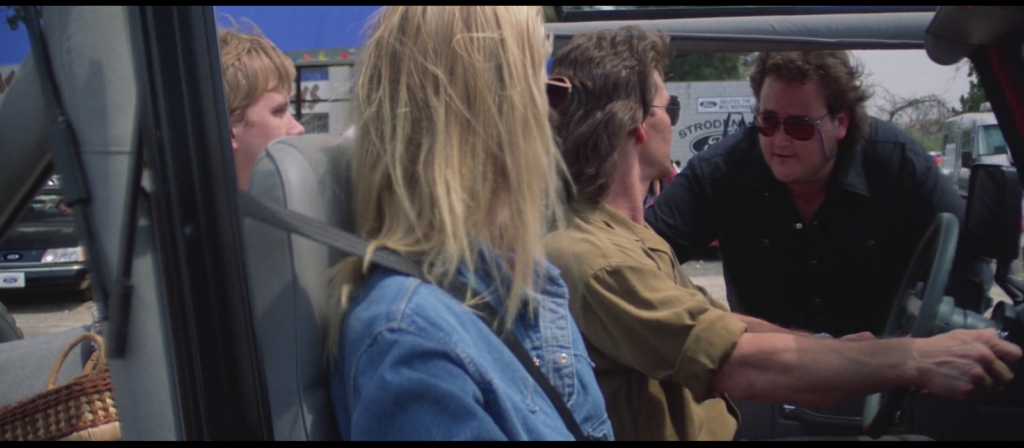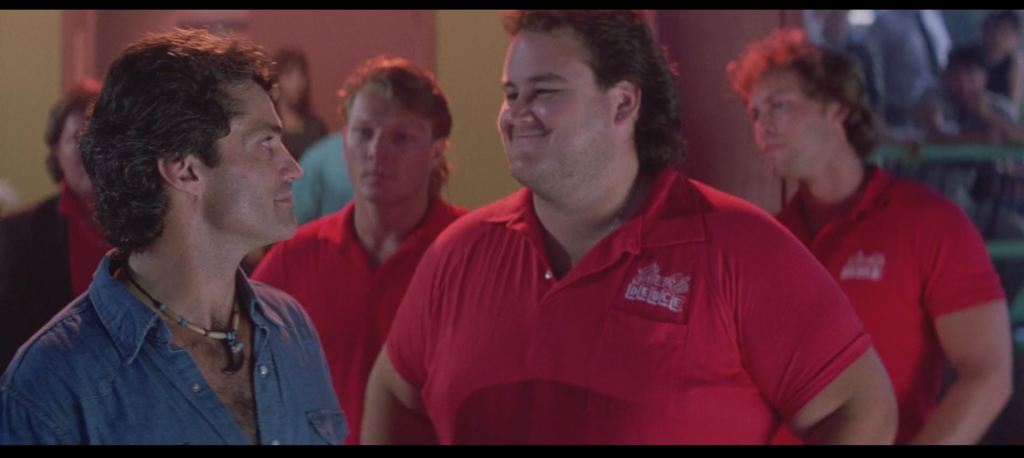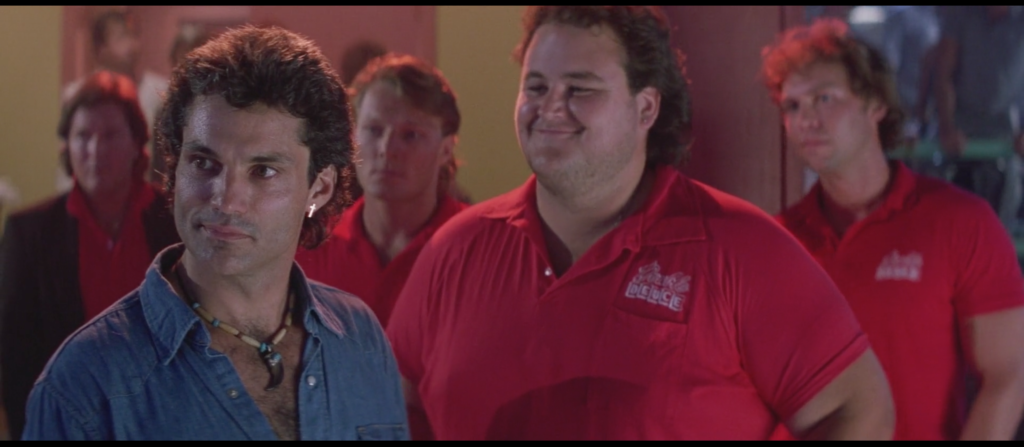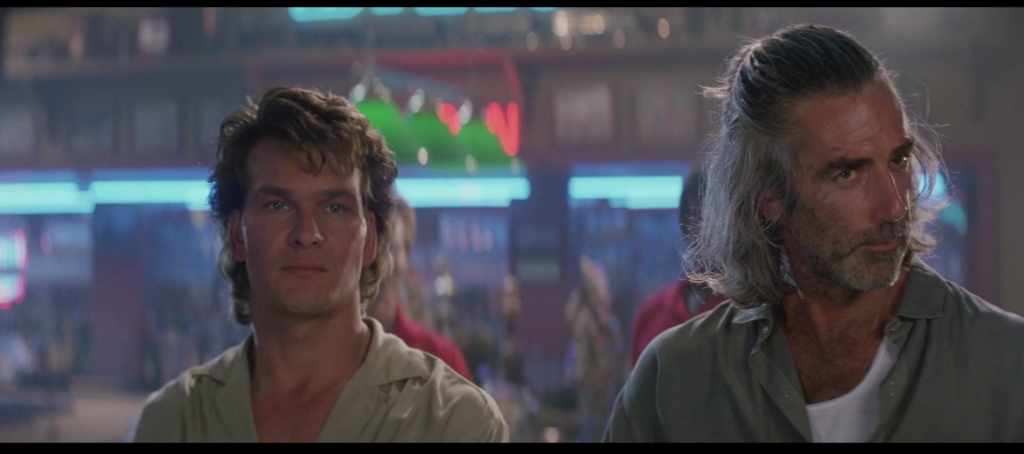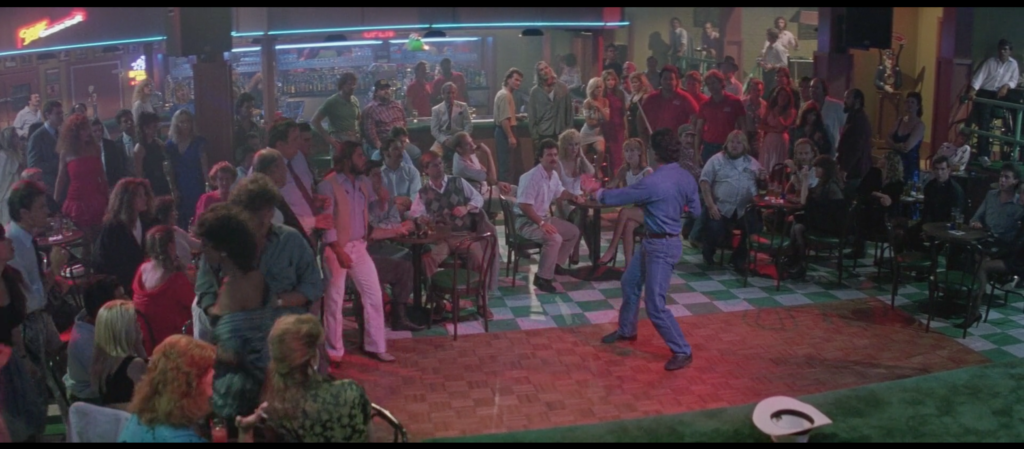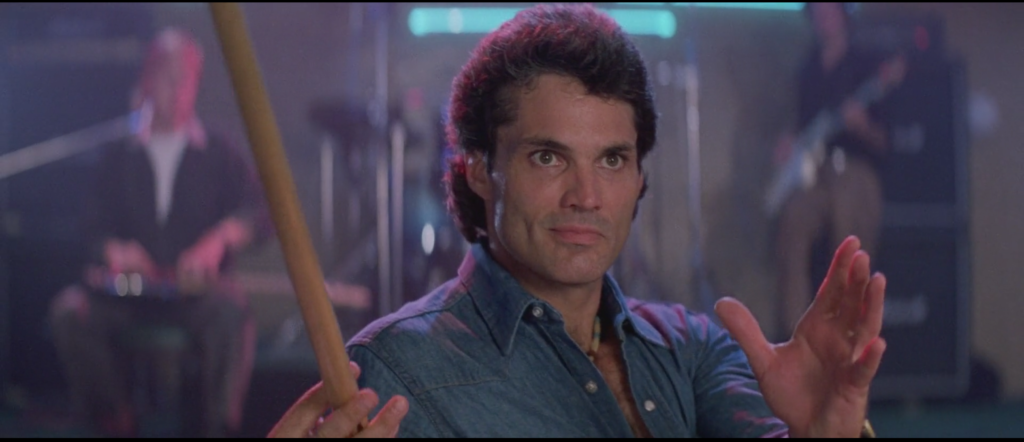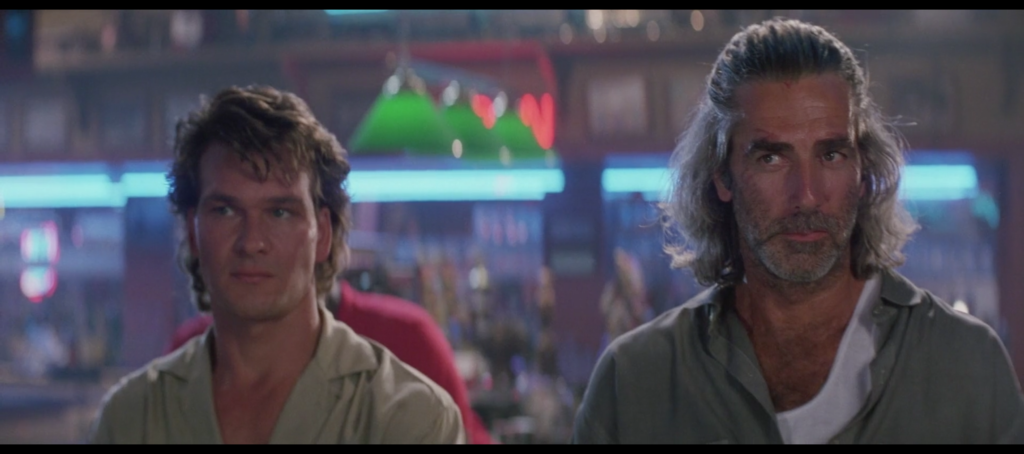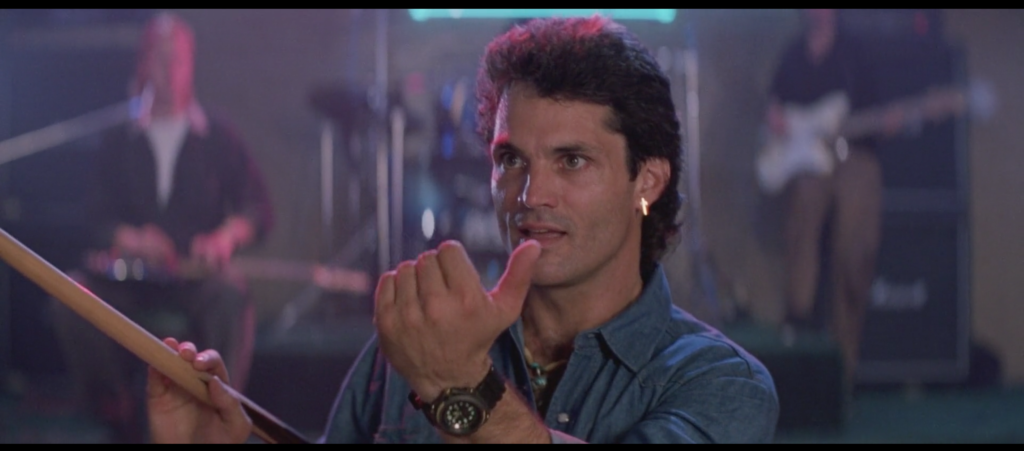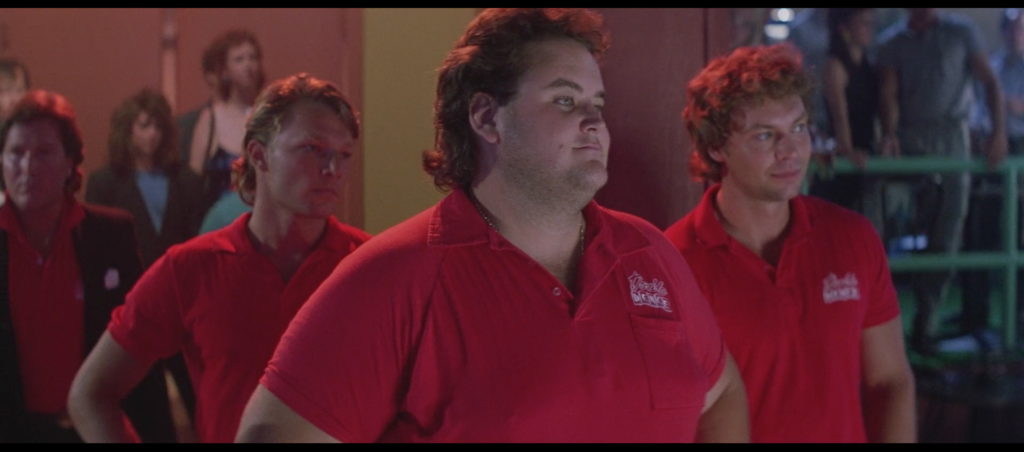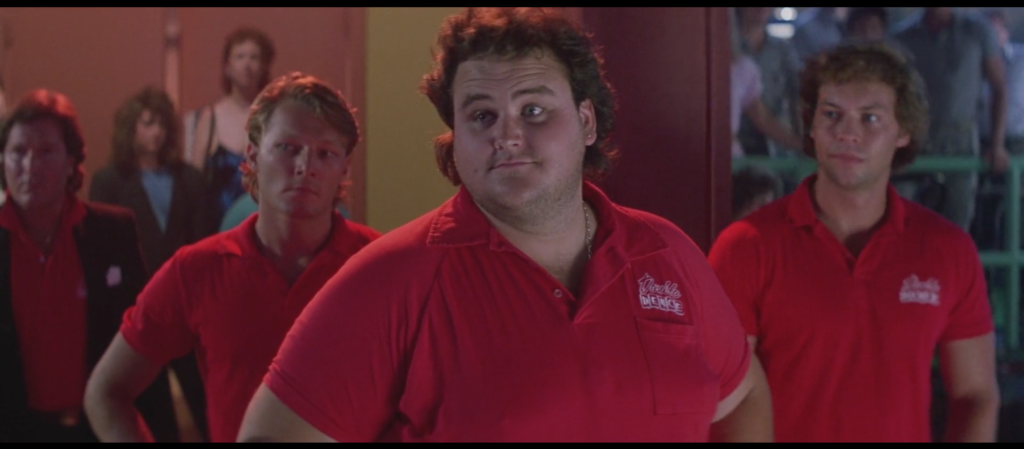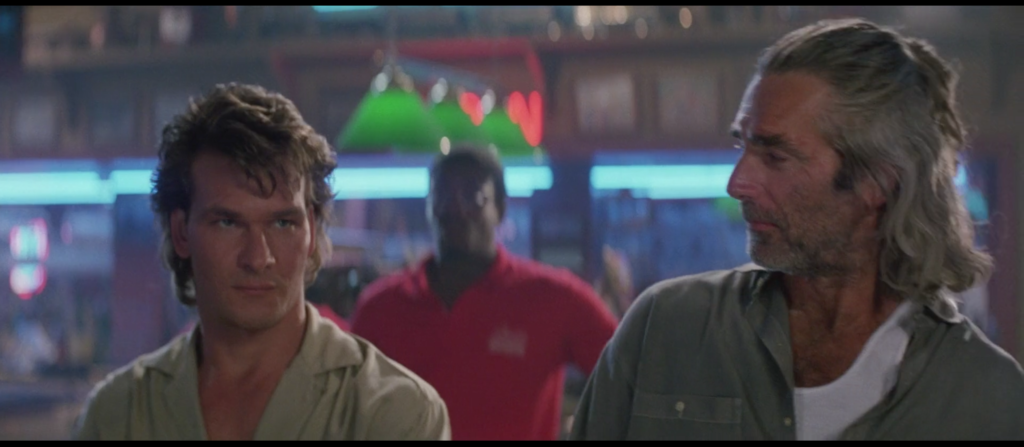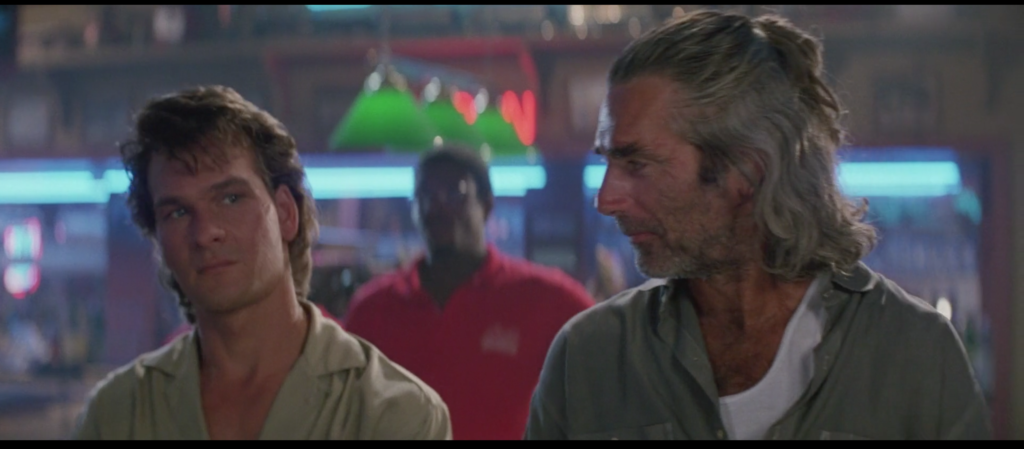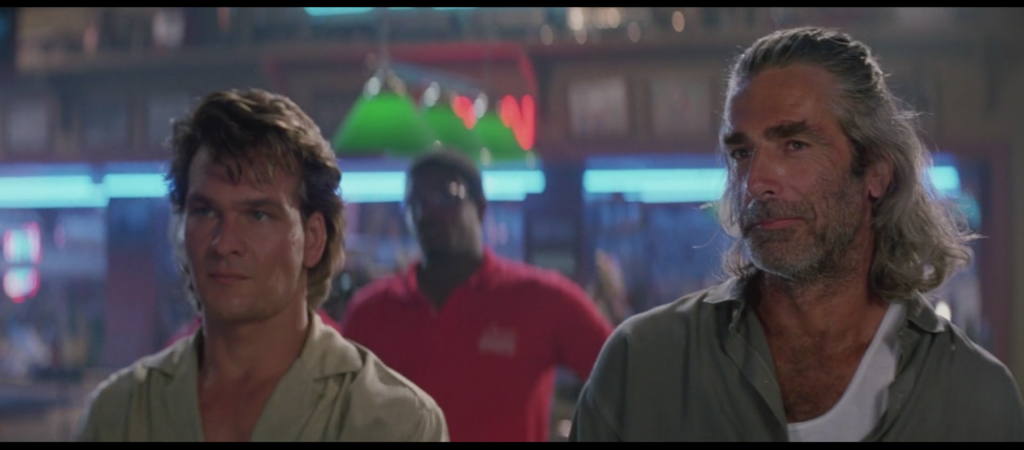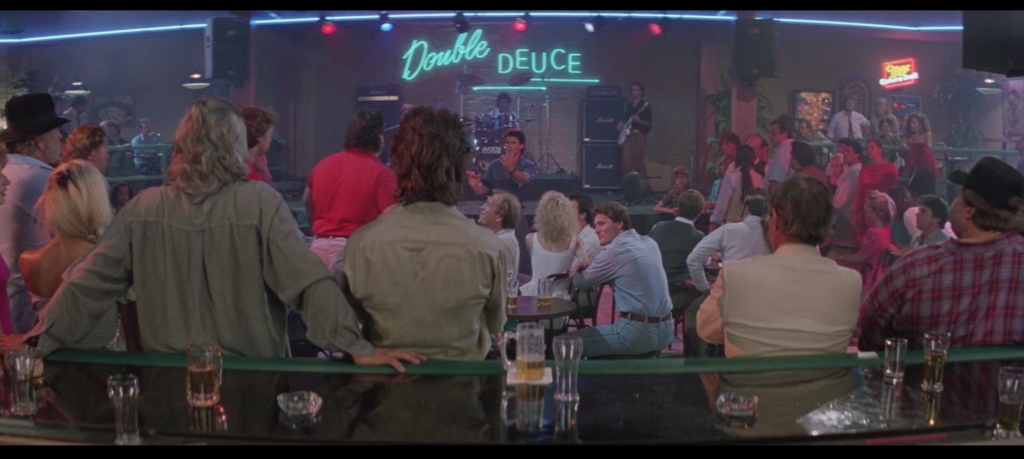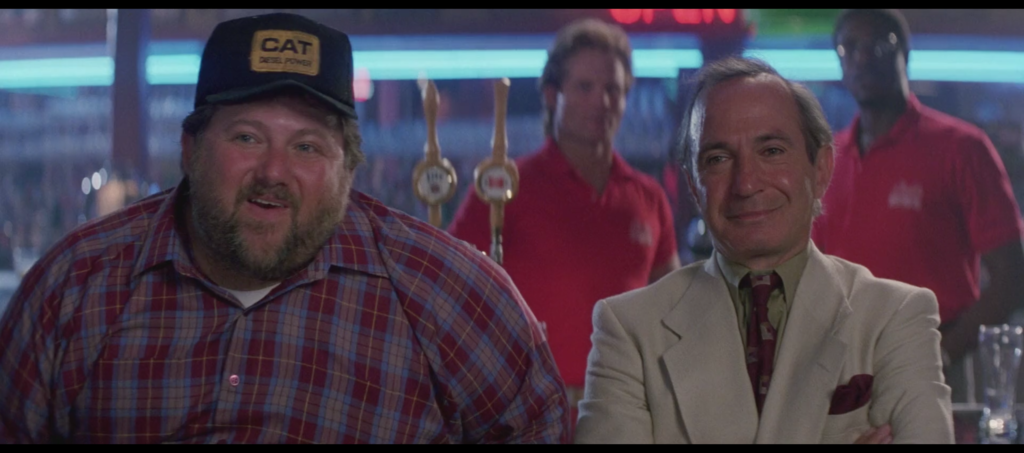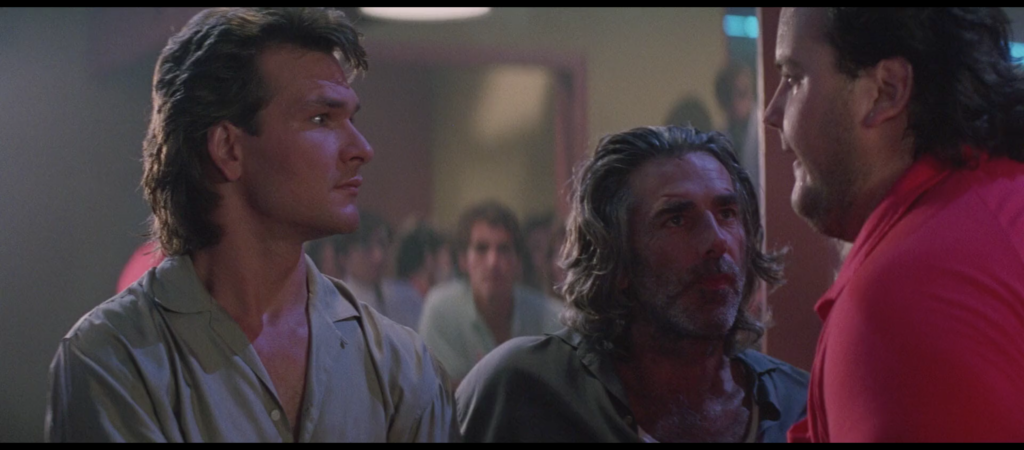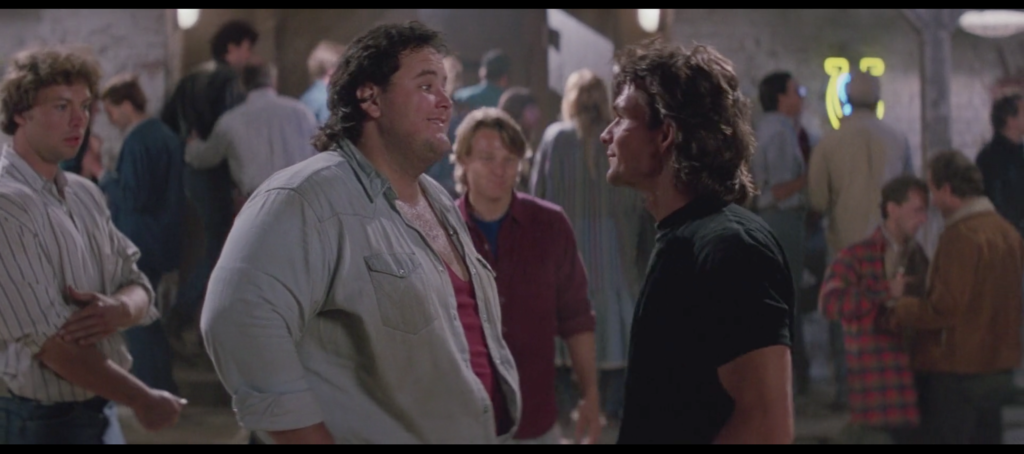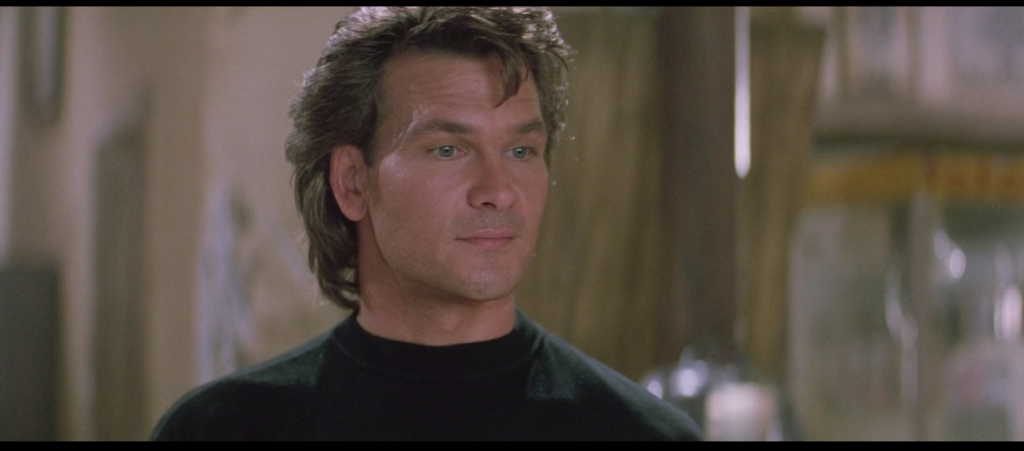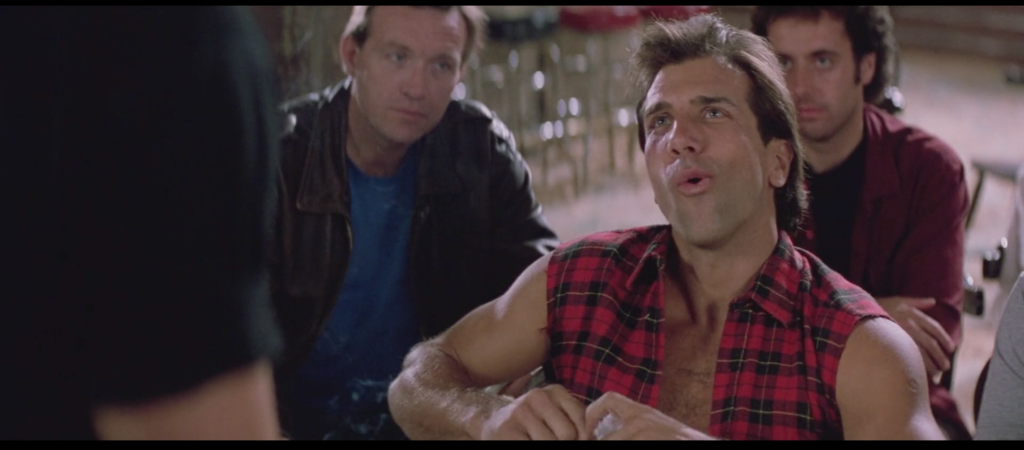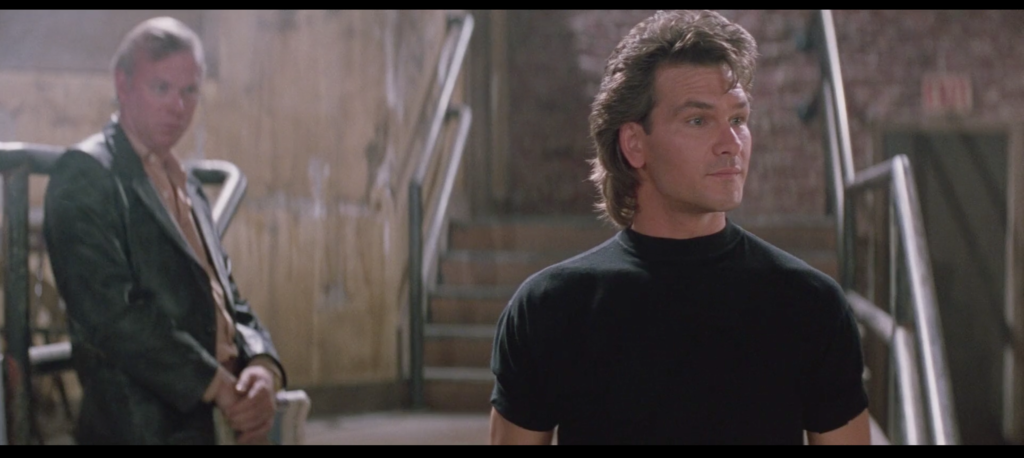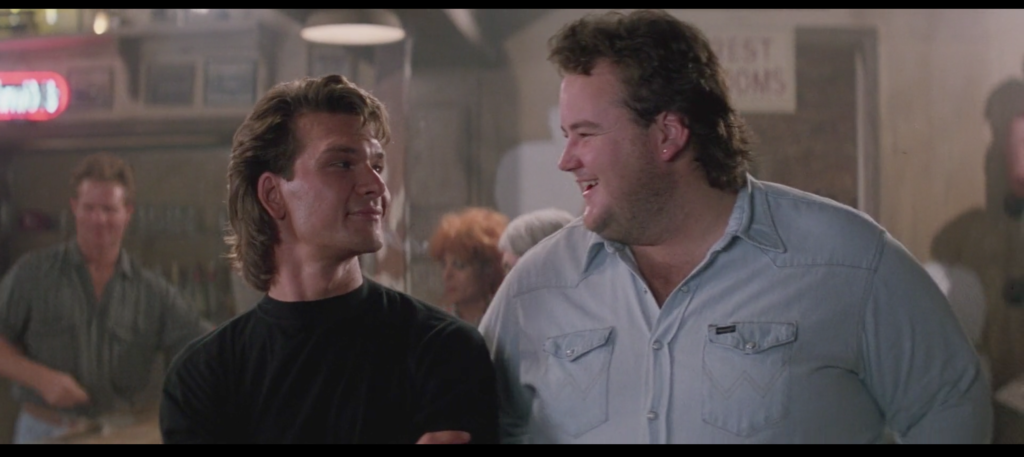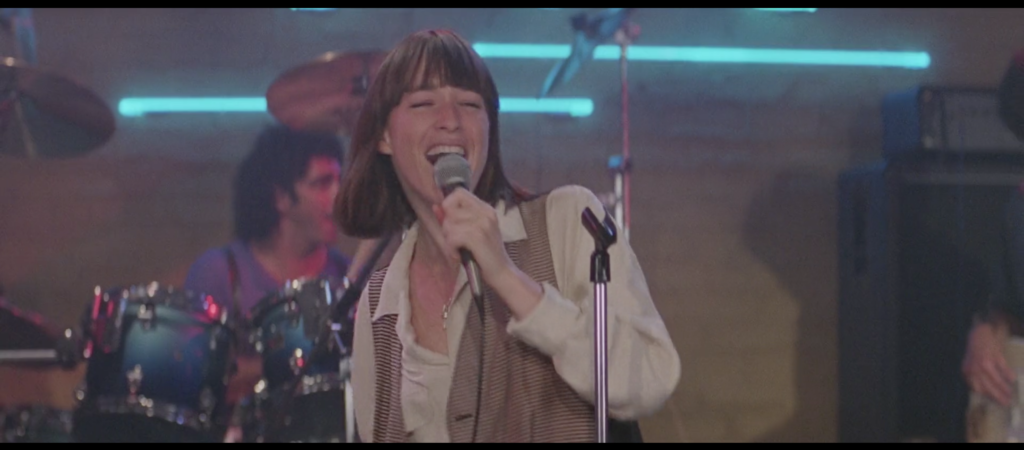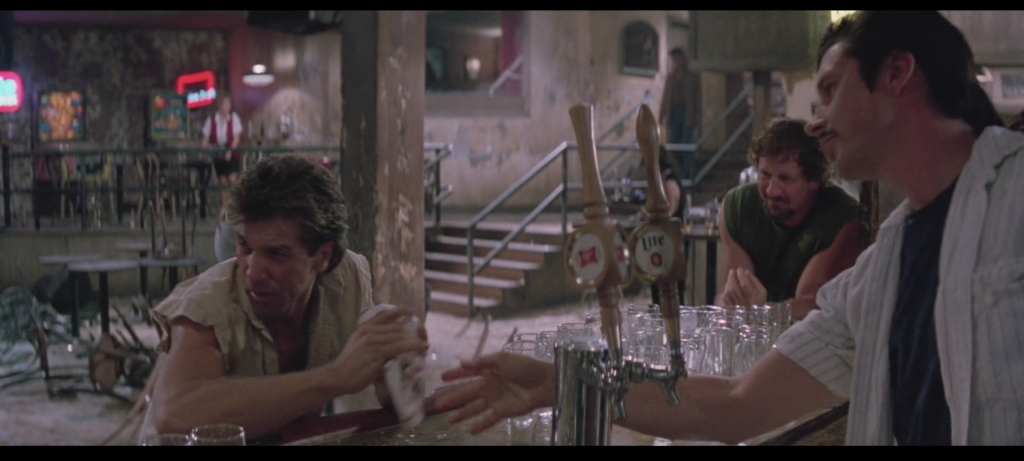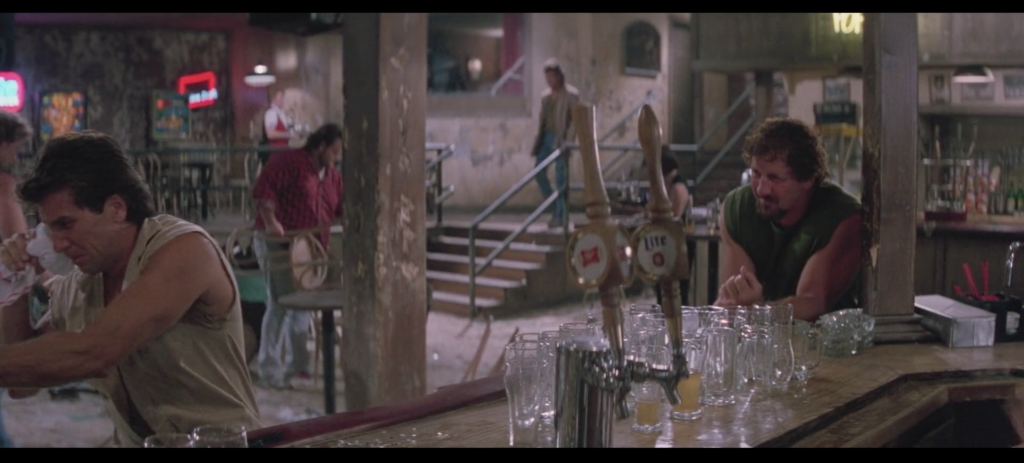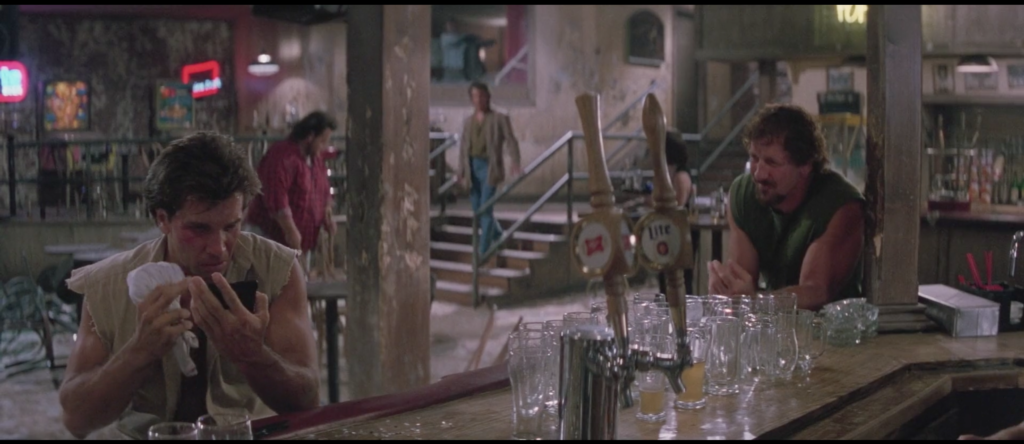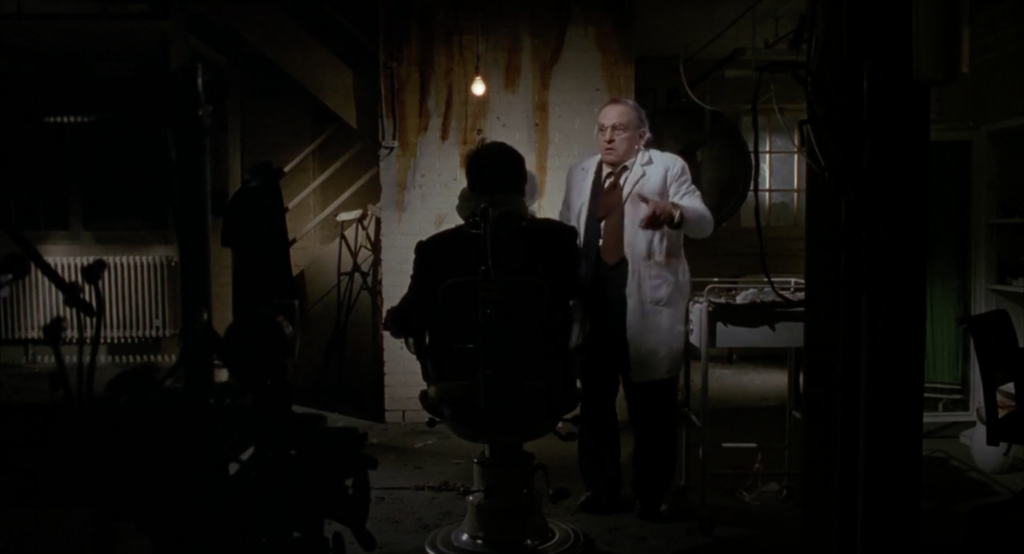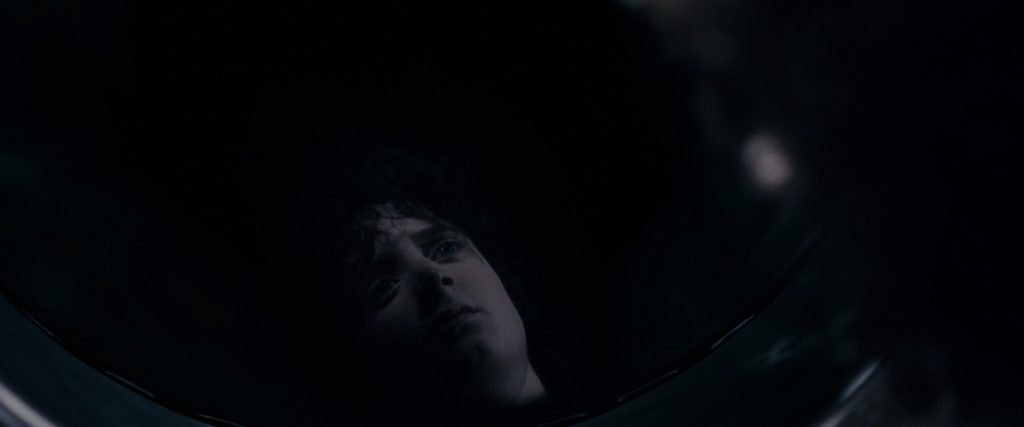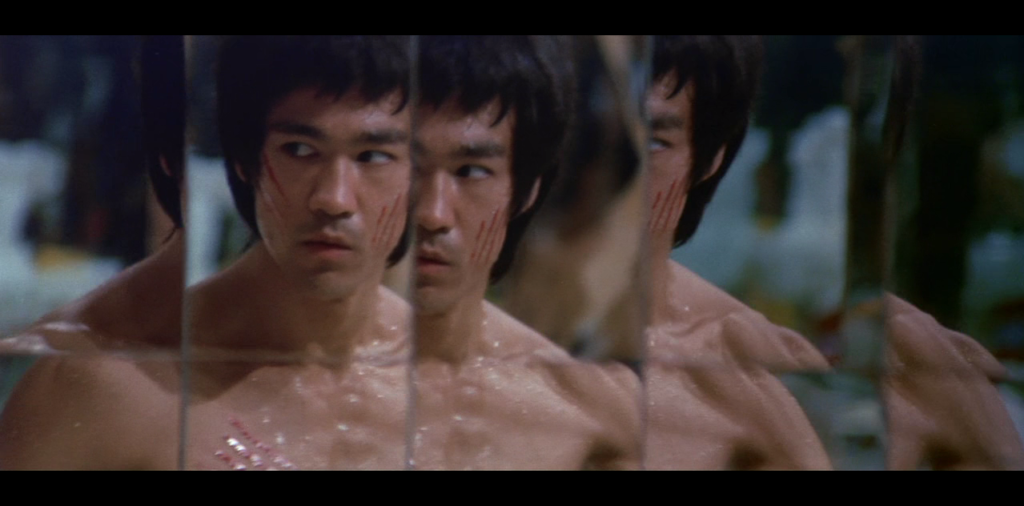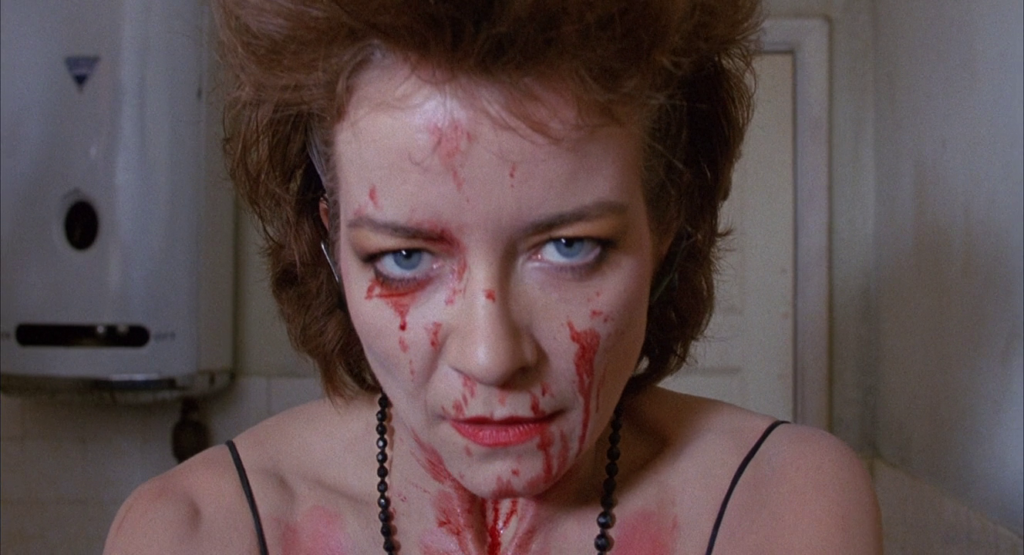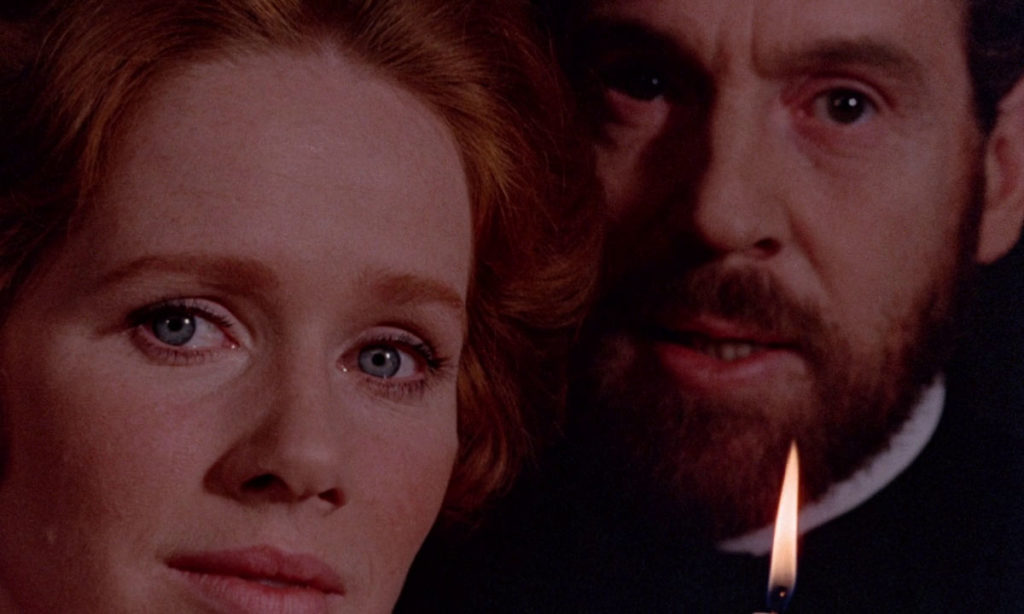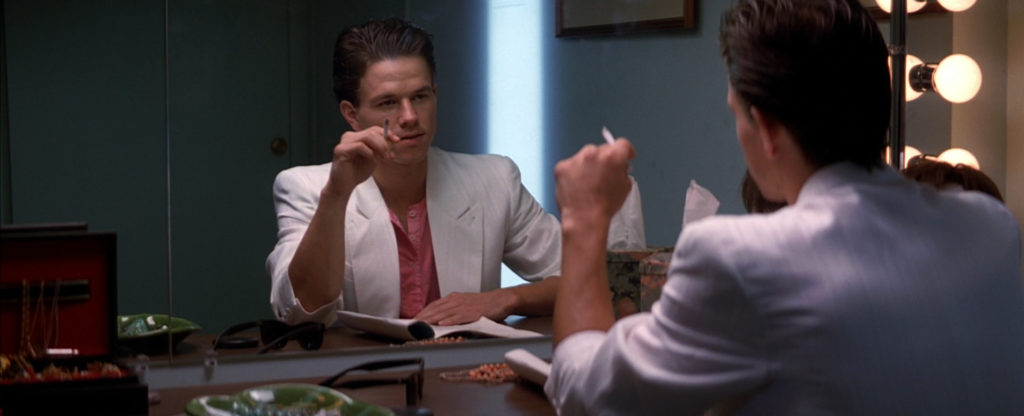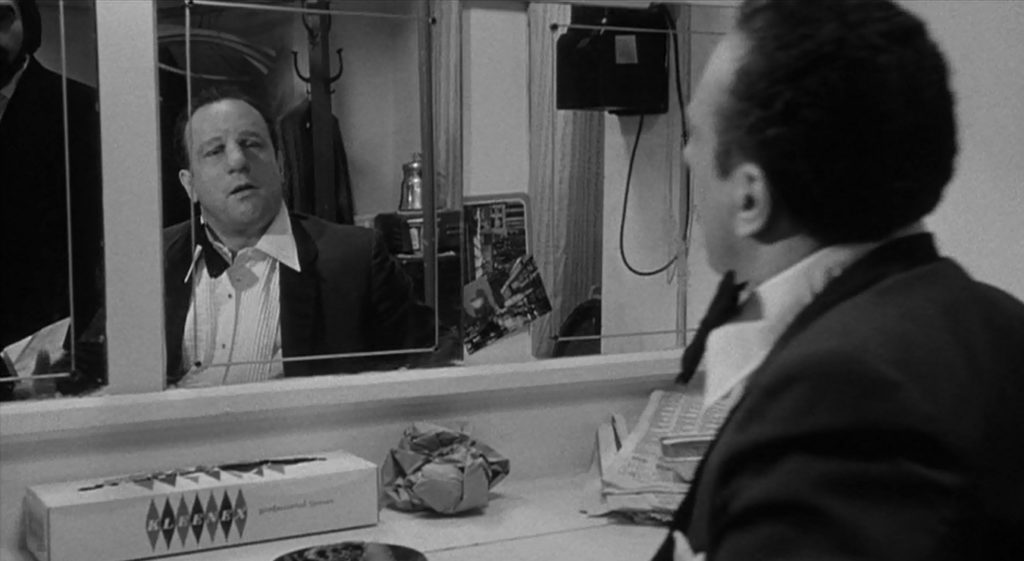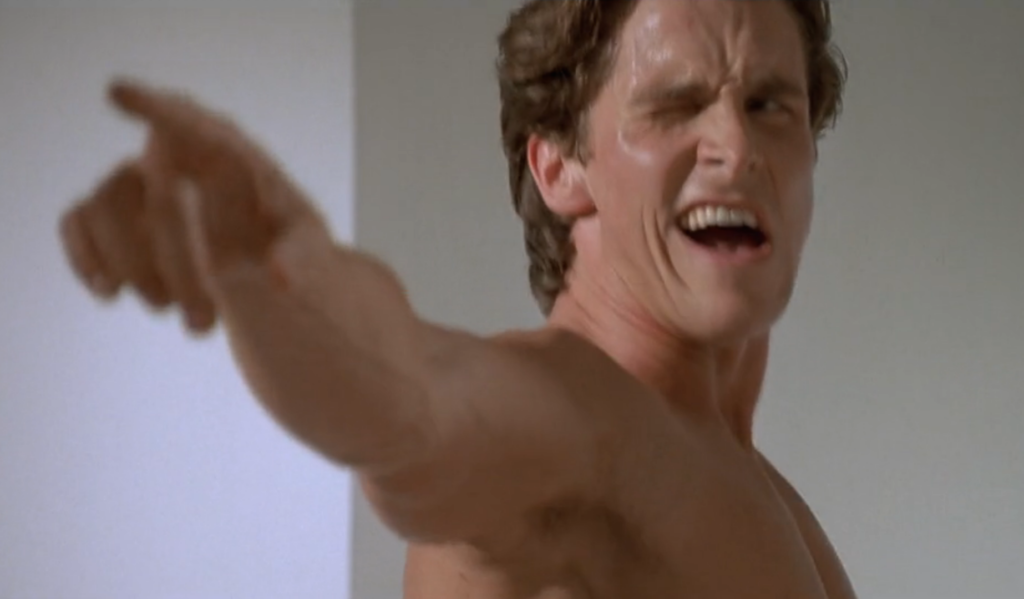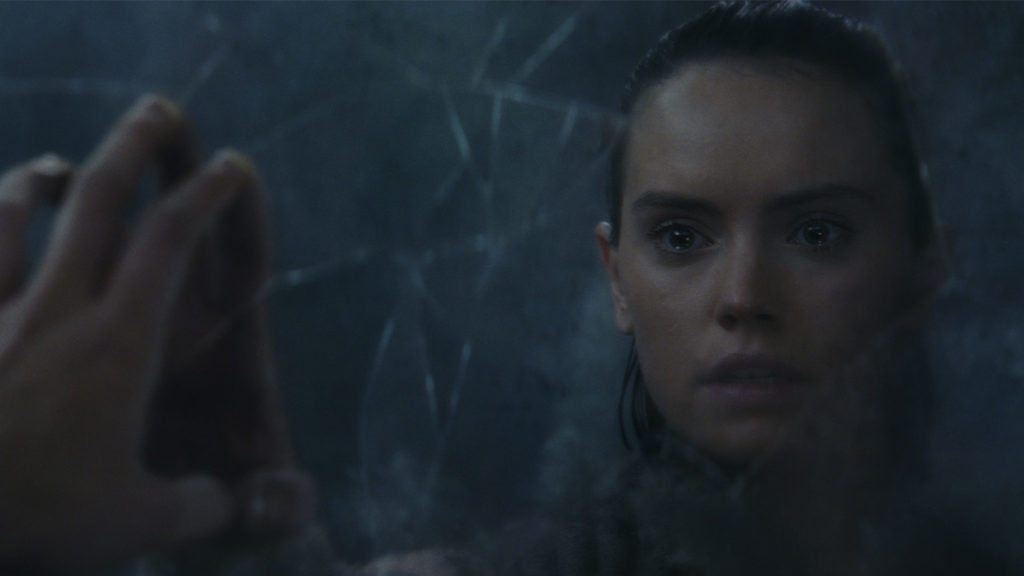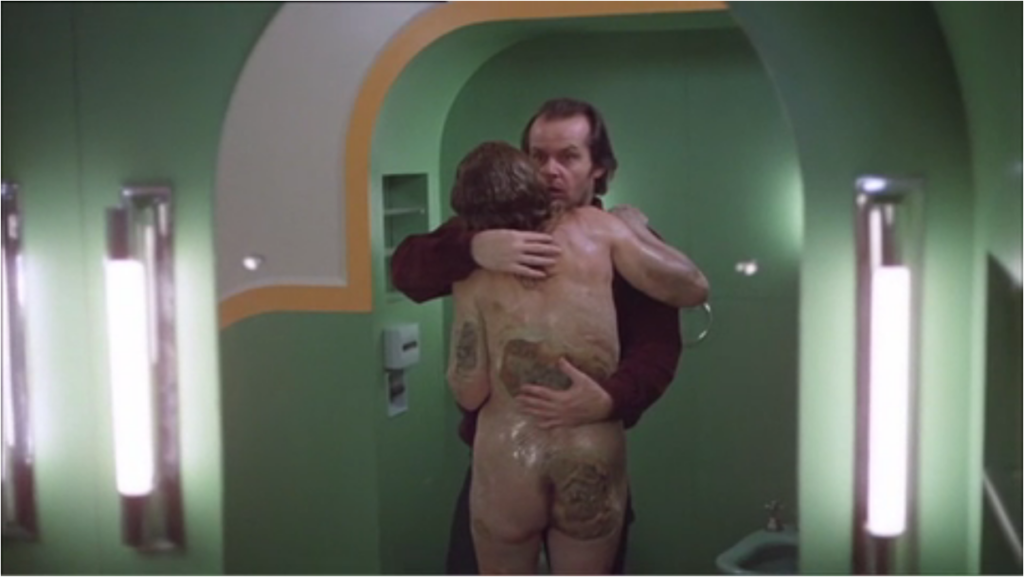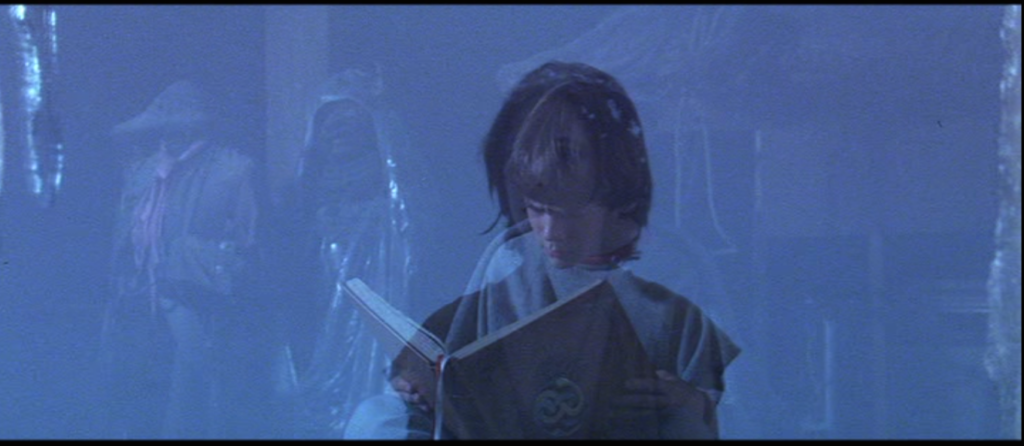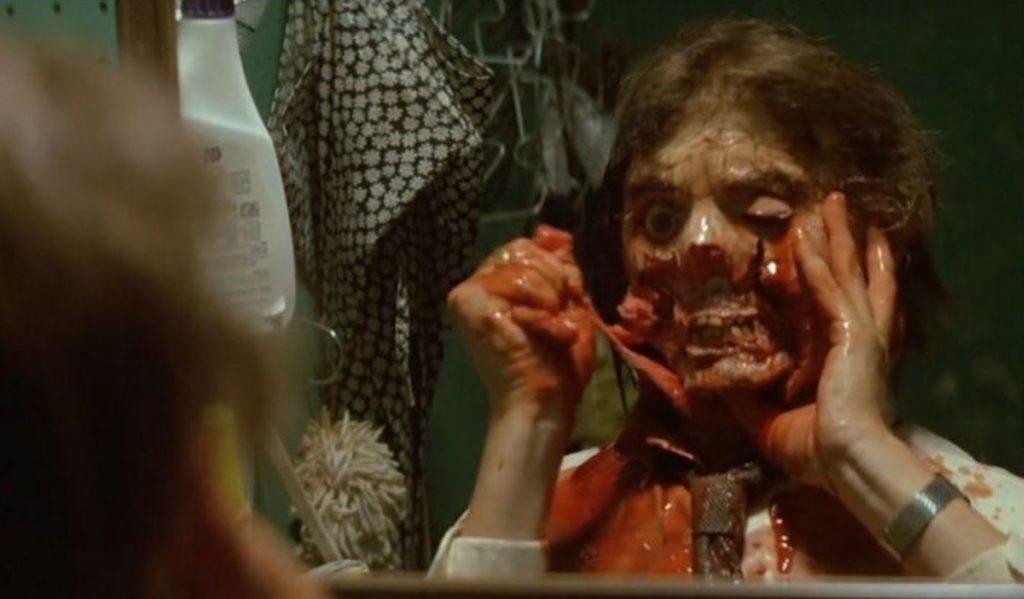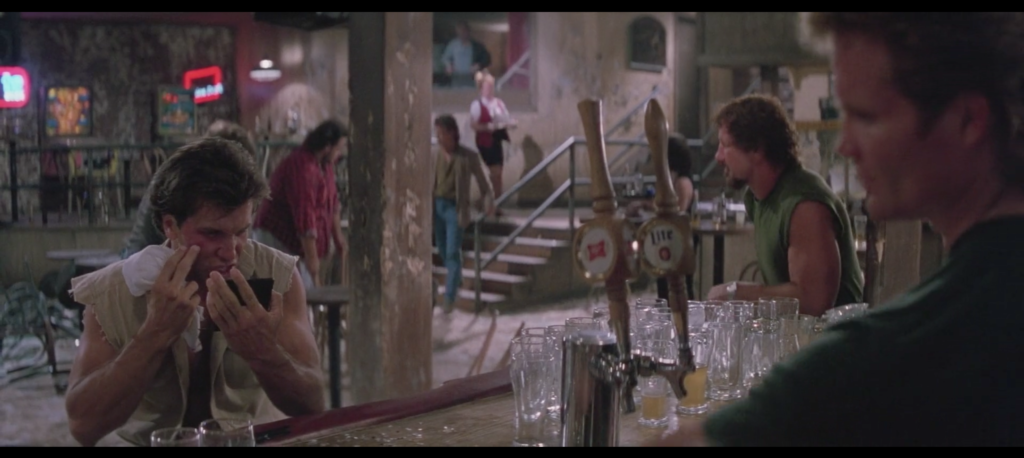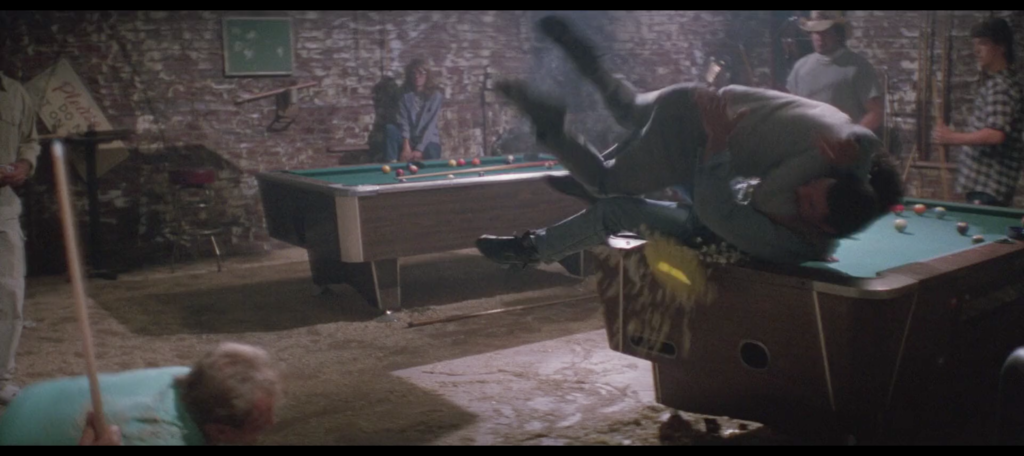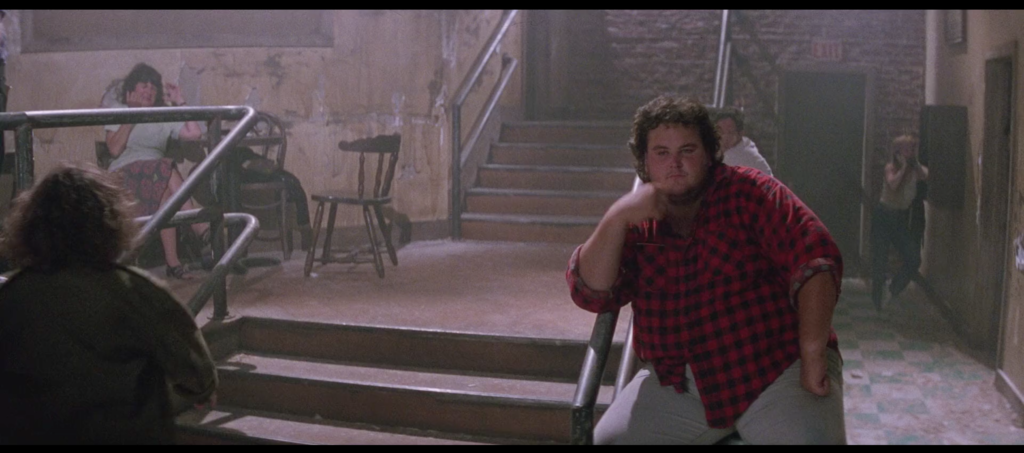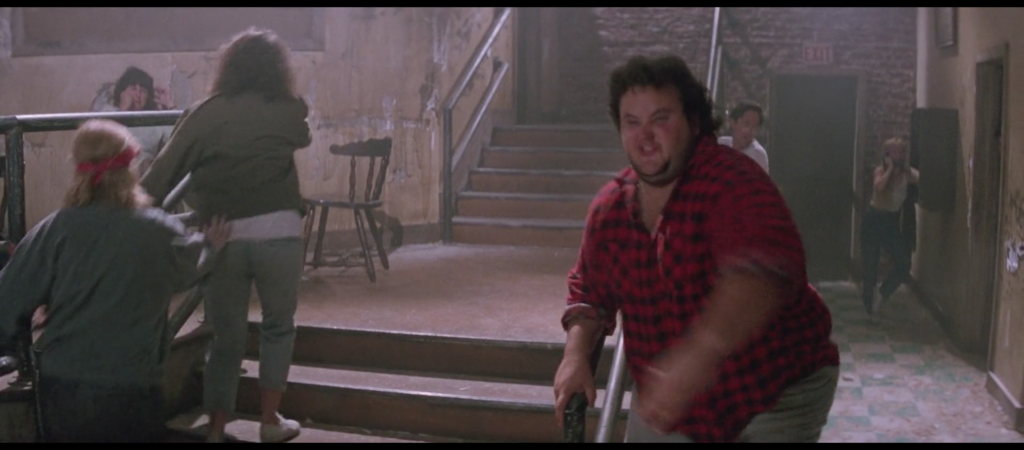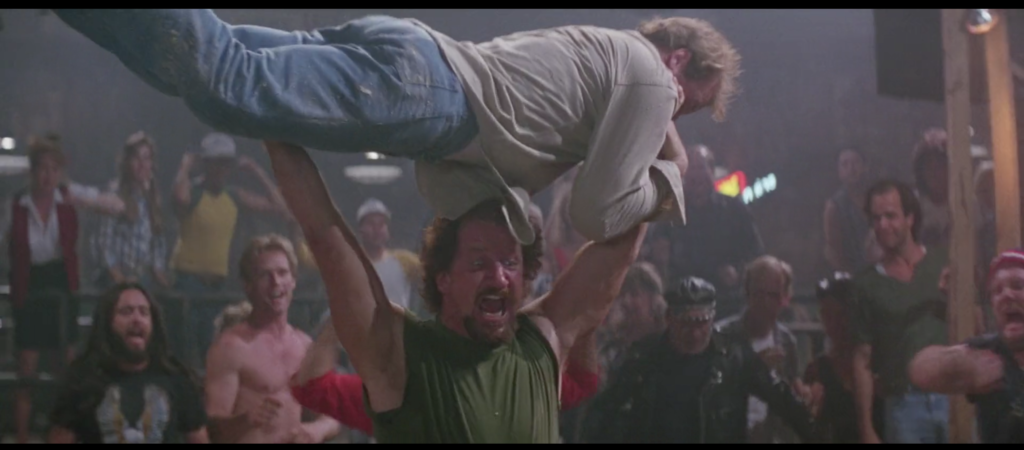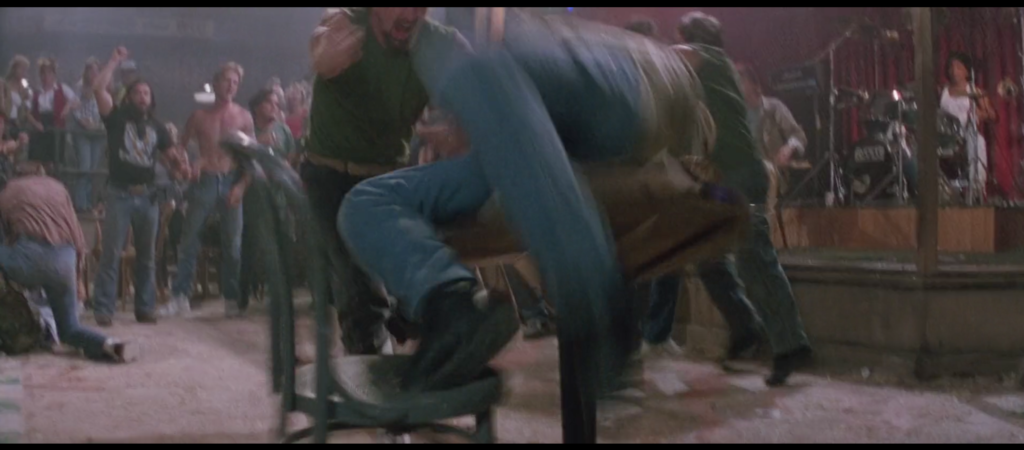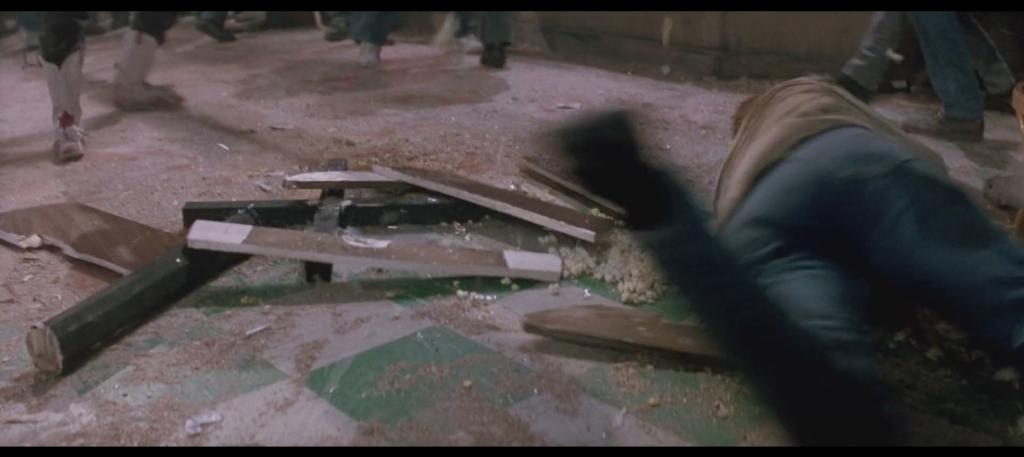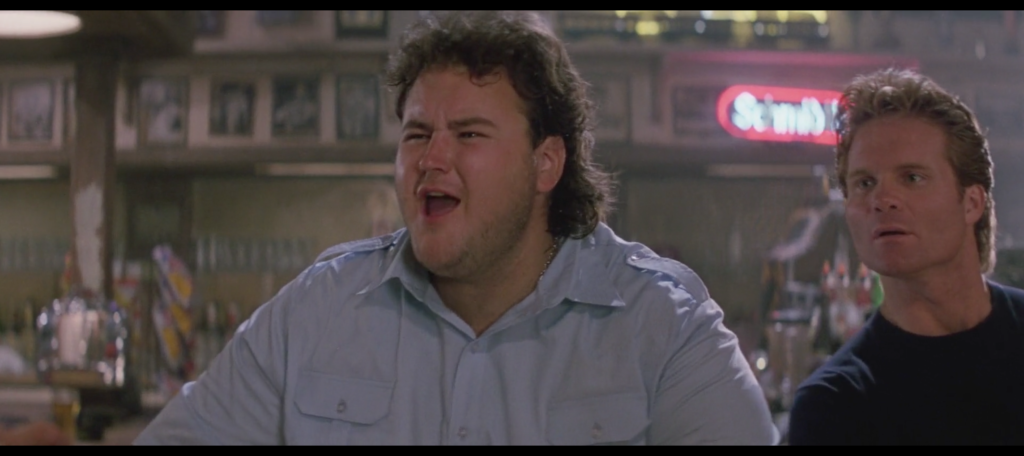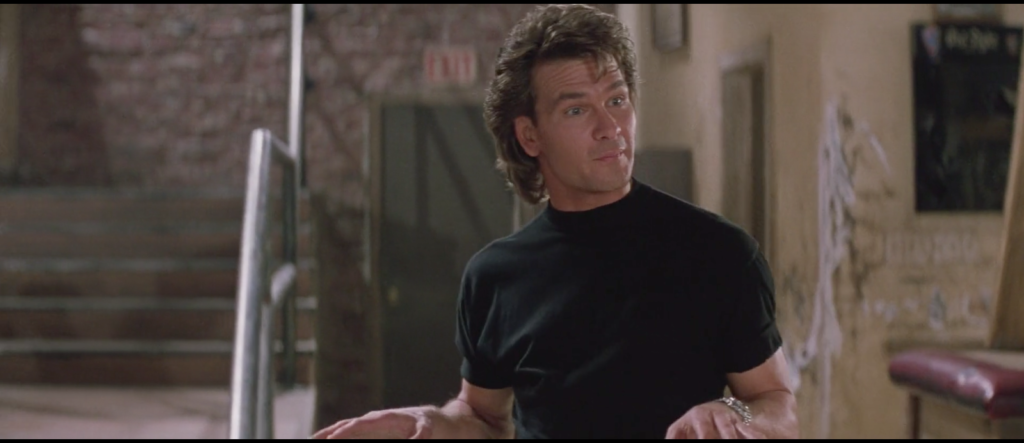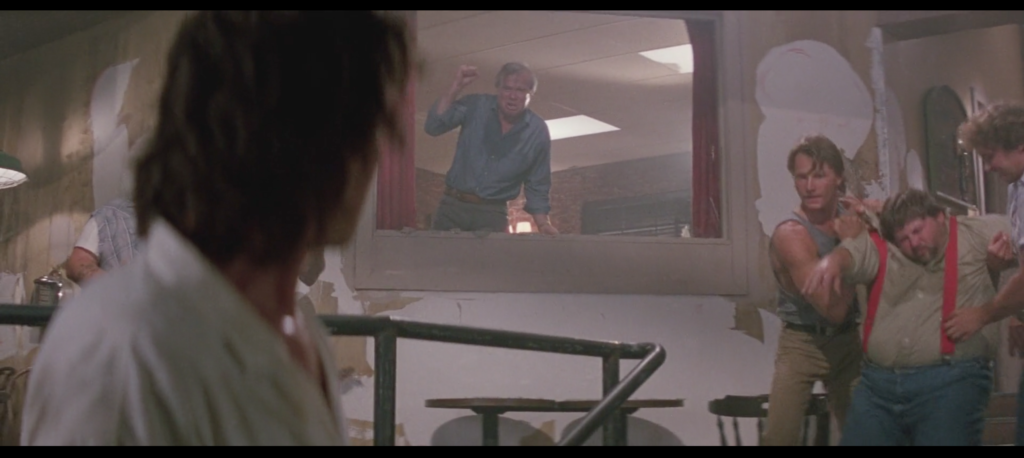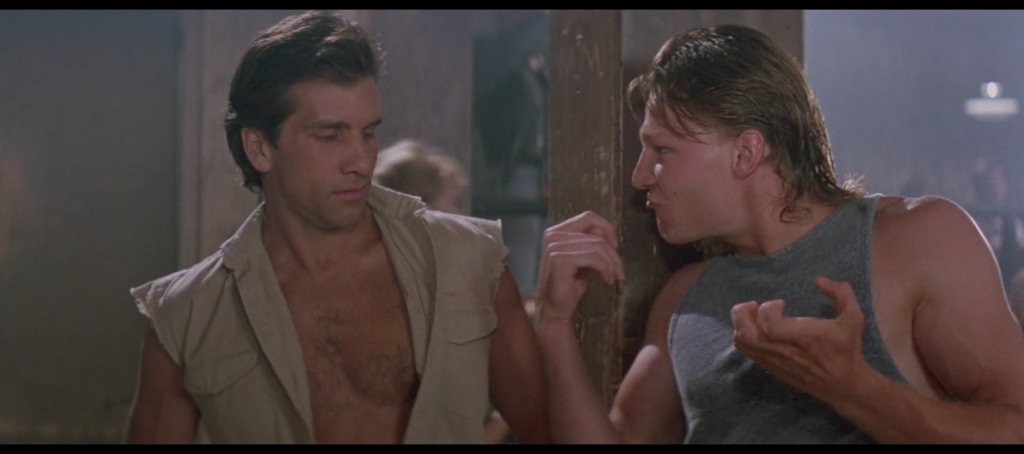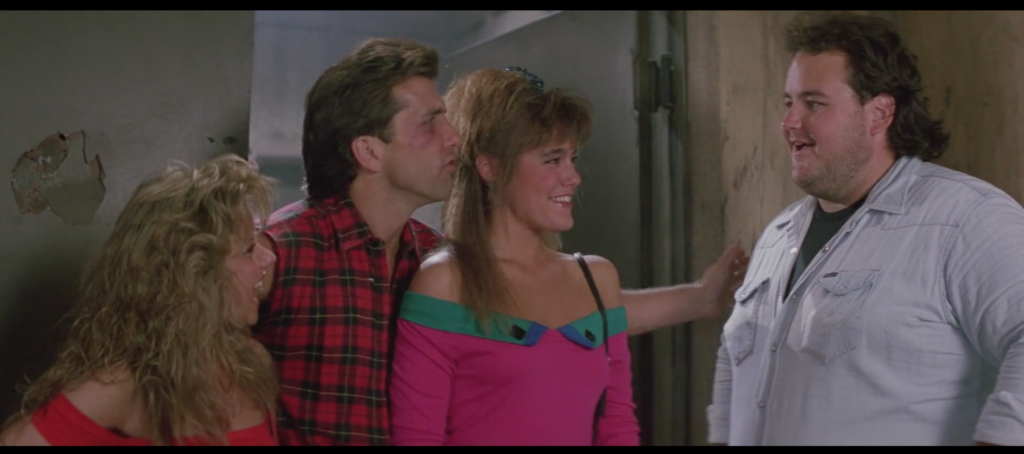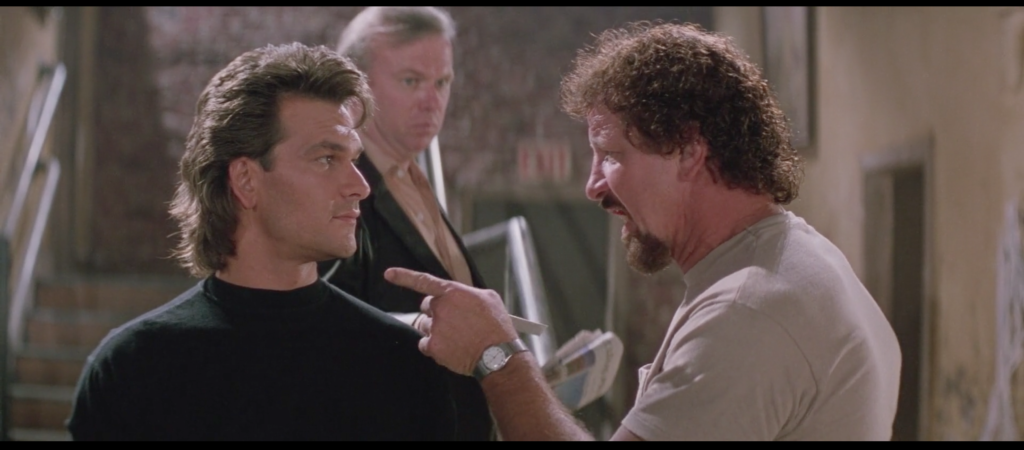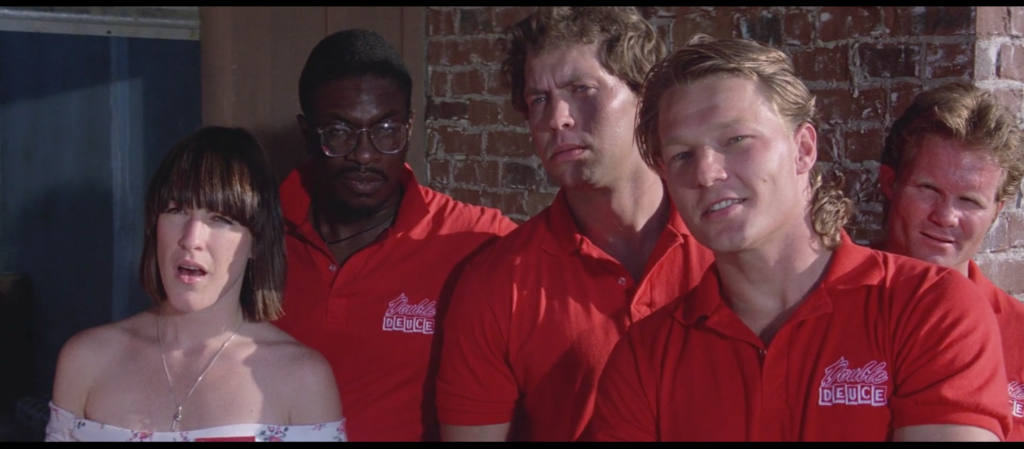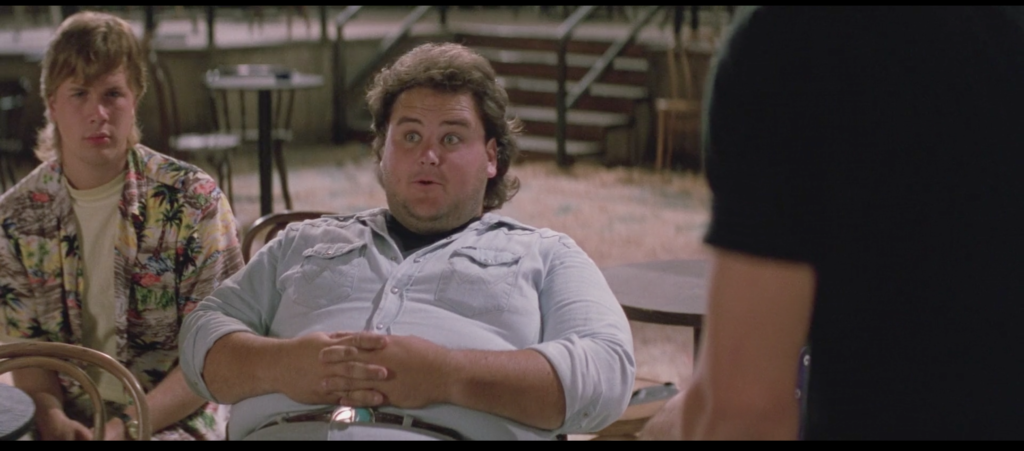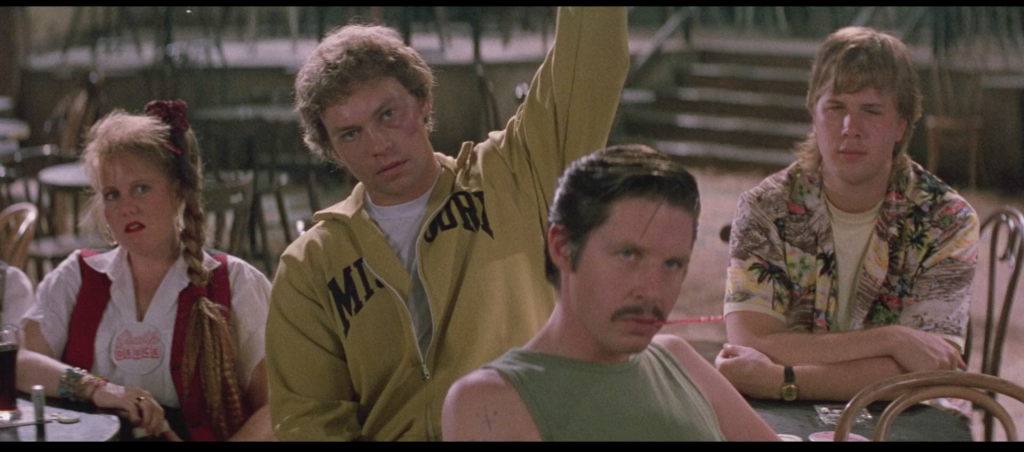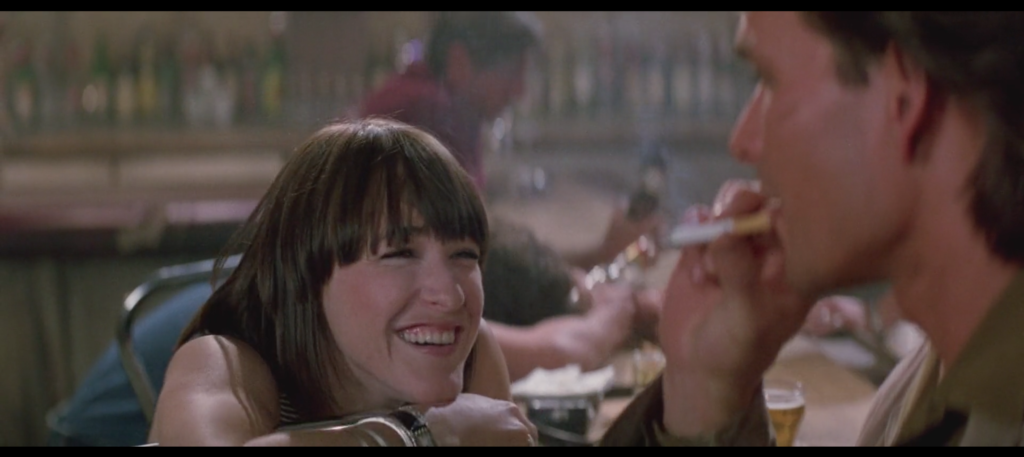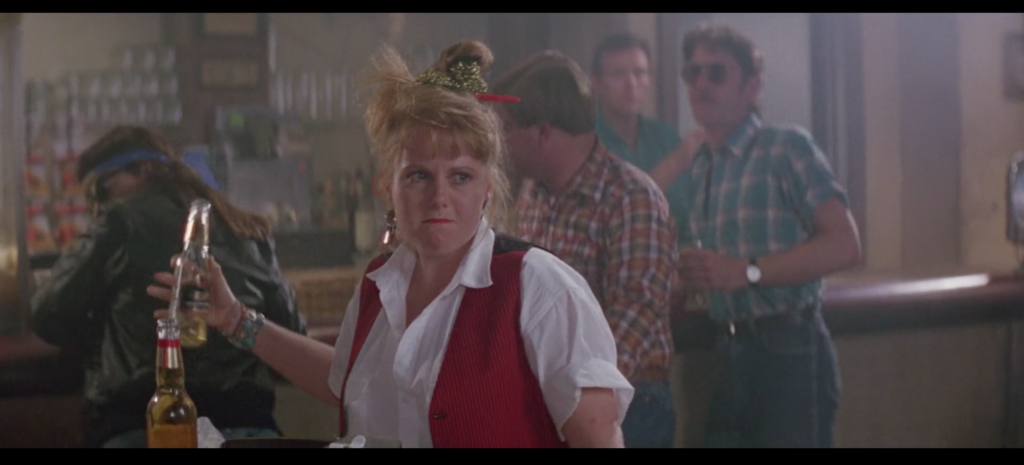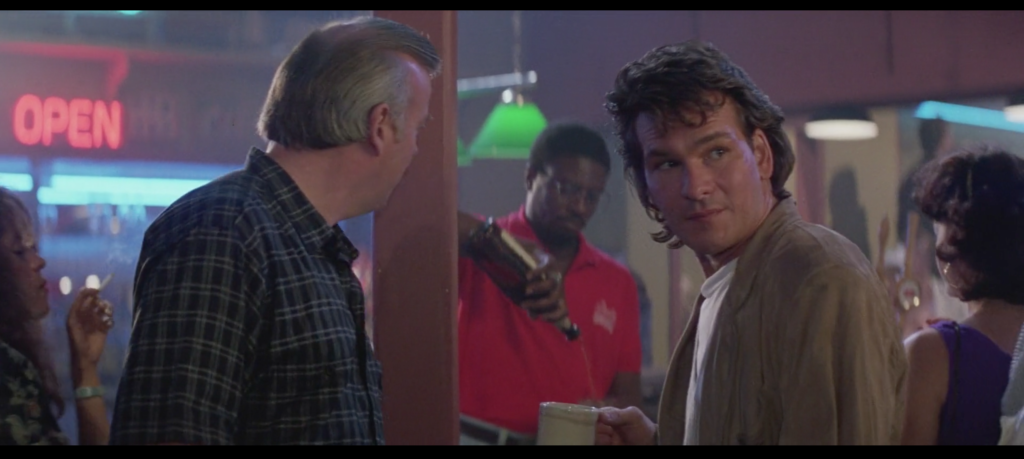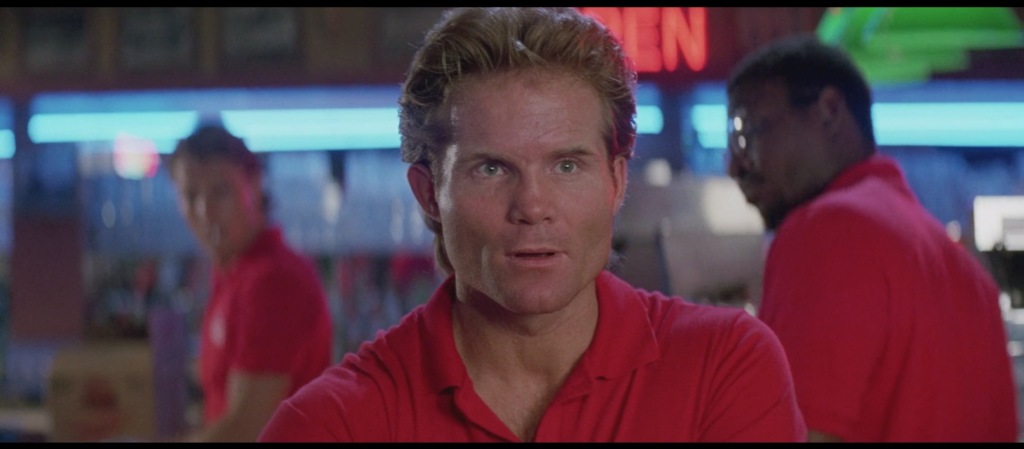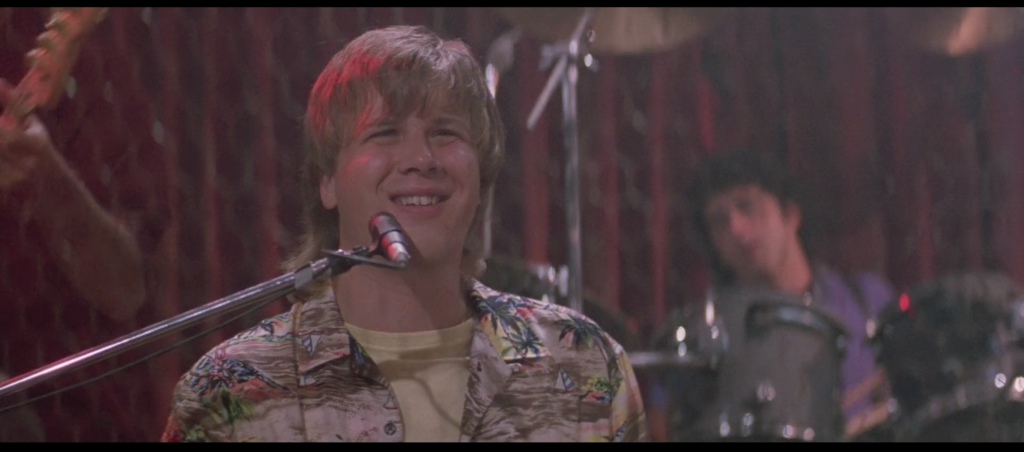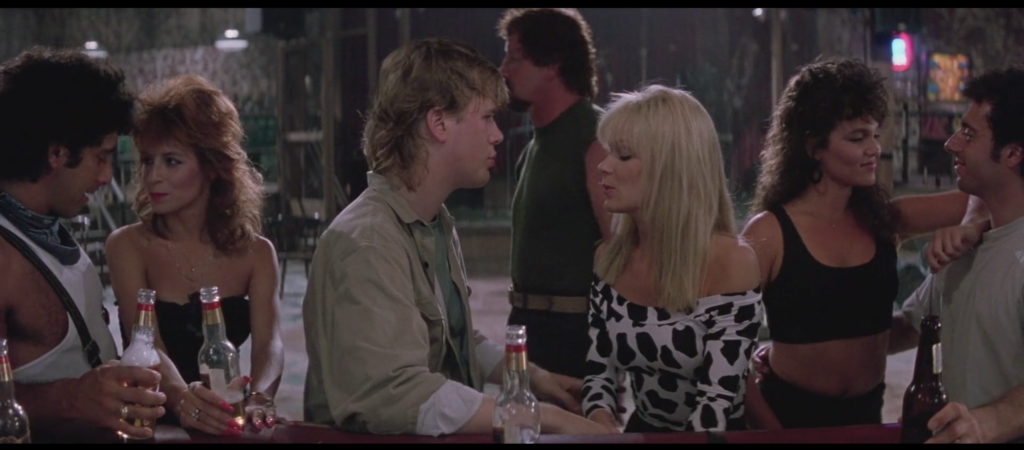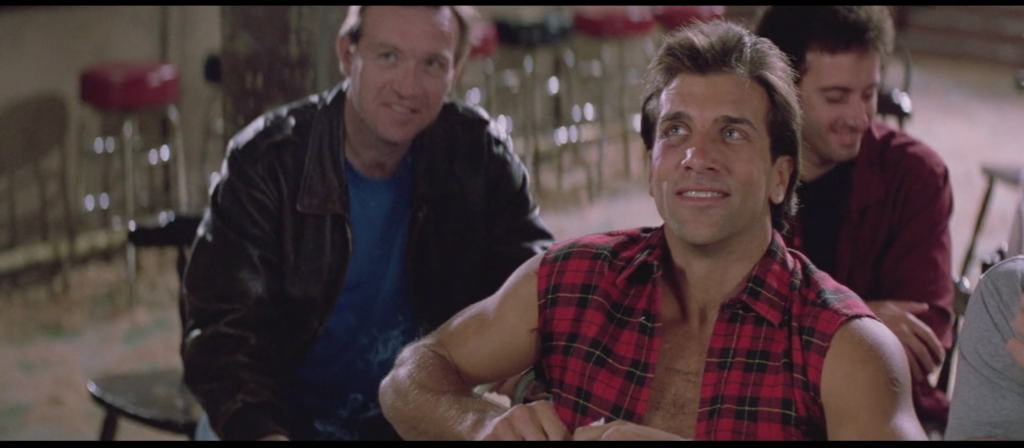Posts Tagged ‘bouncers’
266. Head On Down to Wagon Days
September 23, 2019“Dalton, you gotta check this out,” Jack says. “Looks like Wesley wants to put a little something down on a new car.” This is his tipoff to his boss that Brad Wesley plans to take a monster truck and destroy a car dealership with it. Why he chose to deliver this information in a wisecrack is the viewer’s to decide. Spider-Man, I’m thinking—Jack reads Spider-Man comics, hence the resort to jokes during tense moments. Do I get a No-Prize?
But Jack and his banter and his weirdly small boots with his stonewashed denim tucked into them is beside the point. Mostly I want to call attention to the assemblage of humanity present for the impromptu monster truck rally. Jack is there, and so are his Double Deuce coworkers Carrie Ann and Frank Tilghman. Red Webster is there too—guess he didn’t skip town after all—along with Emmett, who has finally taken his place in the Council of Elders I suppose. Brad Wesley has brought along virtually his entire goon crew, though that’s to be expected when you’re planning to destroy a place of business in broad daylight.
And here in their car are Dr. Elizabeth Clay, Dalton, and Cody from the Jeff Healey Band. What was their plan for the afternoon? What did that conversation sound like? “Hey Cody, it’s Dalton. Look, me and the Doc were gonna swing by Wagon Days at Strodenmire Ford after lunch sometime. Wanna come with?” “Sure thing, man, just gotta drain the main vein first.” “Okay, well, as I said we won’t be heading over till like one or two, so you should have plenty of—hello? Hello?”
255. Faces
September 12, 2019132. Jack reacts
May 12, 2019Jack is Dalton’s most promising student, his protégé, the Dalton to his own Wade Garrett. He’s the quickest both physically and mentally, he sees things others do not, he is seldom far from Dalton’s side (except when duty-bound to be elsewhere of course), he shares his observations of the world and receives Dalton’s in turn. Throughout, whether with the genuine happiness of “I didn’t know she could sing!” or the shocked disbelief of “Jesus Christ!” or the exasperated incredulity of “This is a Sears credit card,” he is never less than a hundred percent open to the world and honest in his reactions to it. He moves through life the way one should, even before the Dalton Path lies before him.
But now that it does, even his wordless responses evince that same willingness to take life as it comes. Witness how he handles Dalton’s extremely utilitarian advice following the throwdown with Ketchum and the Men Who Iron Their Jeans Gang. “Give me the biggest guy in the world: You smash his knee, he’ll drop like a stone,” Dalton says, and QED. Jack, however, does not react the way one might to fighting tips, but the way one might to good old-fashioned common sense one has never had the common sense to figure out for oneself until a wiser soul relays it. His eyes widen, his head tilts, his eyebrows go up, he nods slightly, and his smile says “Huh, I’d never really thought about it that way before, but you’re right!” It’s as if Dalton just said “Don’t worry, you won’t have trouble making it to the Fotomat before closing—school’s out, so traffic’s gonna be lighter this afternoon,” or “If you tell the kid no, he’s just gonna sneak in, so at least buying him the ticket to the R-rated movie yourself keeps the lines of communication open.” “Oh yeah,” says Jack’s face, “good point!” Which it is, I suppose, if faced with a big guy and a knee. But Jack teaches us here as much as Dalton does.
130. The Third Rule, Verse 5
May 10, 2019“This is the new Double Deuce,” says Frank Tilghman. We are at the start of an all-hands staff meeting, and Tilghman is pointing to the concept art for the bar’s redesign. But standing nearby is his latest hire, Dalton. It is through Dalton, with Dalton, in Dalton that the new Double Deuce will be achieved. Dalton embodies the new Double Deuce. He is its future.
When Dalton takes over as cooler he becomes more than just the chief bouncer. His role is not to handle a series of discrete incidents, but to institute sweeping reforms that will eliminate such incidents forever. “It’s going to change,” he states—not a threat, not a promise, a fact. His bouncers, too, must change for this to take place. As below, so above.
Bouncing on the Dalton Path is a matter of following “three simple rules.”
This, for the sixth time, is the third.
3. Be nice (continued)
Previously:
- The Great Commandment
- The Parable of Someone Getting in Your Face and Calling You a Cocksucker
- Walking the Dalton Path Together
- It’s a Job / It’s Nothing Personal
Whenever two or more nouns are gathered to call a name, there is hate.This is the difficulty—well, one of the difficulties, in addition to being barred from coming within 200 yards of Jasper High—facing Steve the Horny Bouncer. He has heard Dalton’s commandment. He has heard the parable of someone getting in your face and calling you a cocksucker. He’s heard about the power of community, the innate dignity of the laborer, and the fact that it, whatever it is, is nothing personal. He simply isn’t buying it.
“Uh-huh,” he says, the sarcasm dripping from his lips in sufficient quantity to stain his shirt, were he wearing one. “Being called a cocksucker isn’t personal?” Gyp Rosetti, you have a friend in Steve.
“No,” says Dalton coolly and confidently. (Considering the degree to which men routinely sexualize their antagonism toward him, I’d say this is a man who’s been called a cocksucker many, many times.) “It’s two nouns combined to elicit a prescribed response.”
Well goddamn, looks like he was a linguistics minor in NYU! Thanks there, Chomsky!
Of course, he’s right. One need look no further than the fact that this is my 130th essay about a movie called Road House in 130 days to see that combining two nouns in the right way can elicit one hell of a prescribed response. I have chosen to give myself over to that response, but that’s just it: I made a choice. Dalton is attempting to convince the skeptical Steve that he has a choice too, and he can choose to let that shit slide.
Steve, you will not be surprised to learn, is not buying it. However, while dumb, he is no dummy. He senses he will not be able to best Dalton in the squared circle of neurolinguistic programming. Better for him to take a new and even more direct approach:
“What if somebody calls my mama a whore?”
Actor Gary Hudson’s delivery of the word “whore” is remarkable, a cousin in its way to Joe Pantoliano as Ralph Cifaretto, exasperatedly insisting “She was a hooah.” He takes the word and purses his lips and shoots it out the side of his mouth, like he’s trying to send it scurrying out of the servant’s entrance before the Duchess arrives. Nervous laughter erupts. All that his smug look of triumph afterwards lacks is the voice of Ra’s al Ghul from Batman: The Animated Series saying “Checkmate, Detective” or some shit.
Which leaves him wide open for Dalton’s riposte:
“Is she?”
Nervous laughter bubbles up again, at Steve’s expense this time. His smile sours. He takes the napkin or whatever he’s been tearing up OCD-style and tosses the latest shred to the ground in a rage. Anything he says would imply acceptance of Dalton’s framework, that rather than being some outlandish insult, the notion that Steve’s mother is a sex worker is a matter of some debate. Not since Dalton told Morgan “opinions vary” has he so thoroughly shut someone down.
Note that Dalton himself is agnostic on the issue. I’m not claiming any kind of “sex work is work” points for Dalton; this was an era in which even an NYU philosophy major may not have encountered this kind of thinking, and moreover his attitude toward Denise after her topless dance smacks of SWERFiness. And yet one is reminded, is not one, of Matthew 26:63-64: “And the high priest answered and said unto him, I adjure thee by the living God, that thou tell us whether thou be the Christ, the Son of God. Jesus saith unto him, Thou hast said.” Tou-fuckin-ché, Caiaphas.
And so it us unto you, Horny Steve. You have just given Dalton the rope to hang you with, rhetorically. When you diss Dalton, you diss yourself, and in so doing you yourself have set up the perfect demonstration of the wisdom of “Be nice.” Did Dalton say anything insulting? You’ll notice he did not! He left it to his foe to be his own undoing. Petard, here be thy hoist.
129. The Third Rule, Verse 4 Revisited
May 9, 2019“This is the new Double Deuce,” says Frank Tilghman. We are at the start of an all-hands staff meeting, and Tilghman is pointing to the concept art for the bar’s redesign. But standing nearby is his latest hire, Dalton. It is through Dalton, with Dalton, in Dalton that the new Double Deuce will be achieved. Dalton embodies the new Double Deuce. He is its future.
When Dalton takes over as cooler he becomes more than just the chief bouncer. His role is not to handle a series of discrete incidents, but to institute sweeping reforms that will eliminate such incidents forever. “It’s going to change,” he states—not a threat, not a promise, a fact. His bouncers, too, must change for this to take place. As below, so above.
Bouncing on the Dalton Path is a matter of following “three simple rules.”
This, for the fifth time, is the third.
3. Be nice (continued)
Previously:
- The Great Commandment
- The Parable of Someone Getting in Your Face and Calling You a Cocksucker
- Walking the Dalton Path Together
- It’s Nothing Personal
But there’s more to Verse 4, isn’t there? Dalton doesn’t merely tell his acolytes that bouncing is nothing personal. He chooses to emphasize that bouncing is a job. Bouncing is work. Bouncing is labor. Through this lens, perhaps, we can arrive at the cod Marxism for which Road House has been crying out for years.
We’ve discussed one interpretation of the latter portion of this verse already—the need to maintain a level head, a distanced perspective, the ability to distinguish between professional challenges to be surmounted and personalized challenges to be destroyed.
At this point Dalton could, and indeed at a subsequent point he will, emphasize the “sticks and stones may break my bones” element. He could, and will, insist that though they will be dealing with physically and verbally aggressive patrons, those patrons have no insight into the men bouncing them and thus their words and deeds carry no true weight. That’s one interpretation of “it’s nothing personal,” and it’s valid.
But what does Dalton mean by counterposing “it’s nothing personal” with “it’s a job”? By situating bouncing within the context of labor and setting this up in opposition to the personal, he is underlining—and not for the first time—the communal nature of the task. The bourgeois conception of personhood, atomic individualism, false individual consciousness, Thatcher proclaiming “there is no such thing as society”: These have no place Dalton’s philosophy. When you do a job you do so in concert with your fellow workers, and, ideally, for the benefit of workers as a class.
You are no Morgan, searching for opportunities in which to vent your rage and exercise power at the expensive of the collective.
You are no Pat, enriching yourself at your fellows’ expense.
You are no Steve, fucking young women of uncertain age in the breakroom, or Judy, selling cocaine in the bathroom, indulging in hedonistic pursuits while others shoulder your burden.
“You are the bouncers,” Dalton says at the end of the Giving of the Rules. You are the proletariat. Through your labor the value of the Double Deuce is derived, a fact which is made plainer and plainer as the film goes on.
“I am the cooler.” Dalton is the vanguard. He seizes power with the intent of awakening the wider class of bouncers to their revolutionary potential and diffusing that power among them, and unlike other vanguardist movements he does so.
“Watch my back and each other’s.” Solidarity forever.
“Take out the trash.” Up against the wall, motherfuckers.
125. “I didn’t know she could sing!”
May 5, 2019If this configuration of Dalton and his padawan-learner Jack looks familiar, it’s because we’ve been here before. The exchange and fight scene that are about to occur are perhaps the purest distillation of the Dalton Path in the entire film, following the Three Simple Rules and their various chapters and verses to the letter. As a bonus they show the primacy and utility of Jack among the Double Deuce’s other bouncers. It is Jack, after all, to whom Dalton relays the Riddle of the Right Boot, counting on the younger man to solve it. When they move on the intruders who’ve come to the bar to murder a man by kicking him in the head with a boot-mounted knife on account of the fact that he fired a rich guy’s nephew, they move as one.
But how did they arrive at this point? By what strange magic were Dalton and Jack united at this moment? The magic…of rock.
Specifically Carrie Ann’s variant thereof. The big-grinned barmaid with the bangs has traditionally occupied a privileged position in Dalton’s orbit. It is she to whom he first entrusts the secret of his name. It is she who preaches his name to the other barfolk. It is she who is granted a glimpse of the ass.
Now that the Double Deuce has been cleaned up, it is she who takes the stage to demonstrate this fact to the viewer. Would any woman have been caught dead on the stage of the old Double Deuce, where the only thing separating you from the ravening hordes, whose attention is drawn to and focused on that stage in a way no other staffer or patron can claim, was a thin chickenwire line? To be honest, dead might be the only way a woman would get caught on that thing. Putting a blind guy up there strikes me as some kind of ADA violation as it is.
But now things are different. How different? Different enough that a server is up there singing her gorgeous, joyful heart out. (Kathleen Wilhoite is truly one of this movie’s MVPs; I have no doubt from the way she shakes and grooves and grins and at one point even puts her hand to her face like “holy shit I can’t believe this!” is a sign of completely sincere pleasure on the part of the actor herself.) A few weeks earlier she had to save all her vocal power for yelling “BASTARD!” at people she’d just brained with a beer bottle in a barfight. Now she’s singing Eddie Floyd with the Jeff Healey Band.
That’s why Jack drifts over to Dalton that night: Just to smile with delight and say “I didn’t know she could sing!” He’s so happy in that moment, so happy to see someone he thought he knew reveal a new and exciting side of herself, so happy to know that as a bouncer on the Dalton Path he helped make that happen. It’s his desire to share that happiness that puts him by Dalton’s side when Ketchum strides in, anonymous minions by his side, to try to kickstab Dalton in the skull. The right place at the right time, that time being “time to not be nice.”
Call it a coincidence if you want, or even synchronicity. I call it the ne plus ultra illustration of the Third Rule, and of how the obervance of that rule yields dividends none could predict. Be Nice, commands Dalton. So mote it be.
102. Mirror
April 12, 2019092. “Fuck ’em, they’re brothers.”
April 2, 2019Sibling rivalry. Toys, games, grades, sports, popularity, attention, romantic success, money, status, a parent’s love: There are plenty of reasons to fight with your brothers and sisters, and they evolve over time just like you do. It’s hard to imagine now, as a father and stepfather myself, but time was me and my brother would go at it hard, physically, rumbling around in our basement after some dispute or other. Someone would want to play with something the other one had, or was using, or wasn’t using, or some dumb nonsense. I didn’t like how he’d make fun of me sometimes, and I assume the feeling was mutual. We made up mean nicknames for each other. We’d get each other in headlocks and someone would cry and our mom would tell us to knock it off. During any kind of tussle with my siblings—we have a sister too and if she’d join in with my brother I’d like physically back her away by putting my head against hers, which I did to my brother all the time too, like I was moving them with my mind—I’d kind of stick my tongue out of my mouth and bite down on it in determination, which they referred to mockingly as “tongue power!”, which I absolutely hated. It’s wild, that we fought, partially because I’d flip the fuck out if my kids started laying hands on one another, and partially because we always got along. When I think back on my relationships with my siblings (I am the oldest of three) I can’t think of a single time any of us argued or fought about anything in any serious way. The physical spats had no meaning. I think in my last fight with my brother he bloodied my nose, and after that we both realized without saying so that physically fighting each other was a bad idea.
Family relationships take very sharp turns sometimes. Certainly ours has, both within our original unit and in our own lives with our own families. Time and circumstance have shown me, though I didn’t consciously realize it at the time, that I would I would die without hesitation for these people whom I love so much, without any hesitation at all. I’d imagine they’d say the same if I asked them, which I won’t. I’d rather them never need to know.
Anyway, here are two grown men in denim, throwing haymakers and decking each other onto and off of a pool table in the middle of a crowded bar. Who knows why. Who knows why anyone in the Double Deuce during its Mos Eisley Cantina phase does absolutely anything, or why they choose to do it there of all places. “Fuck ’em,” says Horny Steve the bouncer when Hank interrupts his crude attempt to pick up a teenager to point out the altercation. “They’re brothers.” Once they were children who played together, like my brother and I did. Maybe they fought occasionally like we did. Maybe they spent the preponderance of their time, like the vast overwhelming majority of it, playing whatever the period-appropriate equivalent of He-Man and G.I. Joe was, or watching Star Wars or wrestling or The Goonies or Clue, like my brother and I did. And then they grew up and assaulted each other in the worst bar in Missouri. I know roads like that exist for people. I never ever want to go down one.
087. Jack
March 28, 2019As we near the century mark here at Pain Don’t Hurt, faithful readers will not be surprised to hear me sing the praises of Jack once again. It’s my growing conviction that Road House may be viewed as the origin story of the heir to the cooler’s mantle possessed by Wade Garrett and passed on to Dalton, and that heir is the man above. Why? Because in less than a second after that image, he is also the man below.
Jack goes 0 to 100 real quick.
As well he should! Here, he is reacting to Sharing Husband’s punch and shove of Gawker into Morgan and the entire crowded bar full of patrons. Jack knows the Double Deuce generally and Morgan specifically well enough to know that all hell is about to break loose, and he knows his own trade well enough to know it’s on him to stem the blood-drenched tide. He does so with sufficient alacrity to send the stool on which he’d been sitting skittering halfway down the hall behind him. The dude’s like the Flash, for real. He’s even wearing red. This is the first time we see him spring into action, but as we’ve learned, it is not the last.
The bouncers of the Double Deuce are not a promising lot when Dalton first arrives to take charge of them. Hank is too timid. Steve is too horny. Morgan should by rights be not the bouncer but the bounced. Younger is…present. Jack, though? In A Song of Ice and Fire he would be referred to as the true steel, supple as needed, able to be honed, unbreakable when it matters. Jesus Christ would recognize him as the good ground, bringing forth fruit an hundredfold. It is toward that good ground that the Way of Wade Garrett and the Dalton Path lead. Beyond? The undiscovered country.
083. Table spot
March 24, 2019DALTON: Morgan, you’re outta here.
MORGAN: …what the fuck you talking about?
DALTON: You don’t have the right temperament for the trade.
Hard to argue with that, huh? As a bouncer, Morgan does not seem to have specialized or differentiated his skill set from that which he applies to his parallel career as a Brad Wesley goon. The nominal purpose shifts from “protect the business interests of Brad Wesley” to “protect the peaceful atmosphere of the Double Deuce,” but insfoar as he simply ports the methods of the former to the latter, he’s doing far more harm than good. The table we see him shatter with another human beings body by throwing that body through that table from a height isn’t even the first table we’ve seen him fuck up in this basic way that evening, having ejected the Nipple to Nipple guy by wallopping him into a bunch of paying customers seated around one a few minutes earlier. (One of those customers was Foxworthy, so it’s hard to feel too bad about it, but still.) Not only is Morgan likely the most dangerous person in the bar to patrons of the bar, he’s also one of the most destructive to its property—and to their drink orders, at least one of which the guy above plummets through on his way to the ground. If Morgan’s job truly is to keep the peace in the Double Deuce, he really should start by bouncing himself.
That said, there is a pot/kettle element to Dalton’s callout of Morgan’s mien and methods. You’ll recall, of course, that Dalton’s first order of business upon officially assuming the position of cooler is firing Morgan during an all-hands meeting, as quoted above. But what is his first order of business upon officially assuming the position of cooler once the bar opens for business later that day? Breaking a table with a human face. Hypocrisy much?!?!?!
I doubt it. That’s not really Dalton’s style. As our examination of the Rules has made clear, apparent paradox and contradiction is virtually always a method of education via self-enlightenment. From this we can conclude that Dalton’s objection is not to breaking tables with human beings per se, but the mindset, method, and result of same. The Rules are instructive here, as they always are. “Never underestimate your opponent—expect the unexpected”? Look at Morgan’s face and tell me he’s not feeling the outrage of man who cannot believe what others have dared to do to him. “Take it outside—never start anything inside the bar unless it’s absolutely necessary”? Morgan is deeply inside his feelings; he has the object permanence of a furious toddler and fails to understand that no problem truly starts inside the bar, and thus can not properly assess the necessity of responding inside the bar in turn. “Be nice—until it’s time to not be nice”? I feel it’s safe to say that if you materially contributed to escalating a couple of punches thrown at Gawker by Sharing Husband into a rumble involving two dozen combatants capable of leveling the entire seating area, the time to not be nice had not yet arrived. Only the mind of a cooler knows the day and the hour. Morgan, you’re outta here.
074. “Jesus Christ!”
March 15, 2019Jack is the voice of the people. Leave it to men like Dalton and Wade Garrett to take in the chaos of the bouncer lifestyle and reply with a wry smile and a quip, or with stoic silence. Less seasoned than his mentor and his mentor’s mentor before him, Jack has much of their inherent courage, decency, and adaptability, but lacks the sangfroid common to the cooler. When faced with, say, a bloodied Pat McGurn getting spin-kicked by Dalton through Frank Tilghman’s plate-glass office window, he’s not going to gently shake his head and chuckle to himself or something. He does what you and I might do: make a face conveying almost comical levels of disbelief and gasp “Jeeesus Chrrrist!”
It’s a not dissimilar reaction to the one he has when Horny Steve’s latest lady friends try to gain access to the Double Deuce by presenting, as ID, a Sears credit card. Sometimes we need a man like Jack to say “This is a Sears credit card” in such circumstances—not to elevate the problem to the realm of the philosophical as Dalton might, not to make light of it with a dick joke like Wade would, but just to call it like it is. Then he leaps over the bar and runs into the fray, because he’s still a character in Road House. But the point stands.
Indeed, when you see a guy get bodily launched through a window by an itinerant bar-knight, “Jesus Christ!” is not just appropriate but salutary. We in the audience are rarely afforded a reaction to the truly ridiculous violence in this film that acknowledges it as such; god knows that several times during my initial viewing, and often thereafter, I watched people get tossed into furniture or punched in the skull and thought the moral panic about violent action movies was eminently justified, even understated.
There’s a degree to which watching Road House is like getting punched in the nose and kicked into the next room. Jack gets it. He usually does. When he says “Jesus Christ!”, what he’s really saying is “I see you, Road House viewer. You are valid.”
069. The Third Rule, Verse 3
March 10, 2019“This is the new Double Deuce,” says Frank Tilghman. We are at the start of an all-hands staff meeting, and Tilghman is pointing to the concept art for the bar’s redesign. But standing nearby is his latest hire, Dalton. It is through Dalton, with Dalton, in Dalton that the new Double Deuce will be achieved. Dalton embodies the new Double Deuce. He is its future.
When Dalton takes over as cooler he becomes more than just the chief bouncer. His role is not to handle a series of discrete incidents, but to institute sweeping reforms that will eliminate such incidents forever. “It’s going to change,” he states—not a threat, not a promise, a fact. His bouncers, too, must change for this to take place. As below, so above.
Bouncing on the Dalton Path is a matter of following “three simple rules.”
This, once more, is the third.
3. Be nice. (continued)
We’ve established the Third Rule’s Great Commandment, and we’ve examined its combination of theory and praxis. Today’s lesson follows closely in the latter’s footsteps. Almost literally, insofar as it’s about walking.
You’ll recall that the previous lesson introduced the parable of the man who gets in your face and calls you a cocksucker. In the lines that follow, Dalton continues the story. “Ask him to walk,” he advises his bouncers regarding such a person, “but be nice. If he won’t walk, walk him, but be nice. If you can’t walk him, one of the others will help you, and you’ll both be nice.”
By now his voice is pleasant, almost cheerful, the “it’s my way or the highway” edge to it long gone. It stands to reason, since the whole point of this passage is that neither he nor anyone else need walk his way alone. You can do so side by side, arm in arm, perhaps even hand in hand. Indeed his delicate double-handed gesture when he says “and you’ll both be nice” suggests nothing so much as a pair of children playing “Heart and Soul” together on the piano in the school music room.
This is the least difficult portion of the rules so far from which to glean the hidden moral instruction beneath the practical element. By way of comparison, eep in mind that “turn the other cheek” was as literal as it gets, at least within the context of the sentence in which Jesus introduced the concept: You get socked in the side of the face, you offer up the other side too. Yet hundreds of millions of people over thousands of years had no trouble figuring out what he was getting at.
I’d like to think that Jack, Hank, and Younger understand that Dalton is talking about more than just the problem introduced by Hank at the start of the Giving of the Rules: “A lot of the guys who come in here, we can’t handle one-on-one, even two-on-one.” Aiding a fellow bouncer in the ejection of a particularly recalcitrant or powerful patron is important. Even reiterating that the purpose of bouncing is to bounce the patron out of the bar, not bounce his head off of it, is important. But is “If he won’t walk, walk him,” so far removed from “it was then that I carried you”? Is “one of the others will help you” so different from “For where two or three are gathered together in my name, there am I in the midst of them”? Seeing yourself as part of a whole that includes the patrons, the bouncers, and the bar—that is the key that unlocks the new Double Deuce, the nice Double Deuce, a house with many mansions. When you walk through the storm, hold your head up high, and don’t be afraid of the dark.
066. Frank Tilghman’s fist
March 7, 2019One thing I never noticed before starting this project, one thing I never noticed before tonight in fact, one thing I never noticed despite watching Road House dozens of times over the course of nearly fifteen years, is that when Brad Wesley’s goofiest goons, Tinker and O’Connor, come to the Double Deuce with Wesley’s nephew Pat McGurn to force Frank Tilghman to overrule Dalton’s decision to fire Pat under threat of physical harm and the cessation of liquor shipments to the bar due to Wesley’s control over distribution in the Jasper, Missouri metropolitan area, and Dalton expresses skepticism about the idea, and Pat almost instantly loses his fucking mind and attempts to slice Dalton open with a knife the size of a Little League baseball bat, and Dalton breaks his nose and tosses him through a plate glass window, and O’Connor assaults him and they both go tumbling through the place where the window used to be, and they fall first to a raised dais and then make their way to the main floor below after O’Connor bumrushes him over the railing, and Dalton pounds the crap out of him and eventually beats him unconscious, and doesn’t even bother to deliver a coup de grace, just kind of holds O’Connor up by his jacket for a moment and then drops him to the ground in disgust, and meanwhile Tinker, who during Dalton and O’Connor’s initial fight in Tilghman’s office punched Tilghman in the gut and then sliced Dalton open with his own knife and then punched Dalton in the face before Dalton kicked him in the chest for leverage to thrust himself and O’Connor through the window, meanwhile Tinker he suckerpunches Younger when he rushes through the door to see what’s going on, but then Hank comes in to help and he and Younger incapacitate Tinker and punch him in the gut while holding him still which is the kind of thing villains do but all’s fair in bouncing, and as Jack and Hank and Younger drag the punchdrunk bodies of their enemies through the bar and presumably to the exit, and Dalton is all covered in sweat and blood and getting ready to head out the back door and go seek medical attention, Tilghman, you remember him, Tilghman staggers over to the broken window and makes eye contact with Dalton and raises his right fist in a gesture of triumph and solidarity that’s one of the most ridiculously obsequious things Tilghman does in the whole movie, which in the parlance of our times puts it in the running for most ridiculously obsequious thing worldwide, I mean Tilghman contributed nothing to the fight, he just got winded by Tinker until he was rescued by the other bouncers, but there he is, small business owner, vicariously victorious in his non-worker role, and Dalton gazes into the fist of Frank Tilghman, as he raises that five-sided fistagon, as the bodies get dragged away.
065. “He killed a guy once. Ripped his throat right out.”
March 6, 2019When Frank Tilghman traveled to New York (City?) to hire the (second) best damn cooler in the business and also cast humorous aspersions on the size of his penis, we in the audience pretty much had to take his word for it. Dalton has great hair, a great body, a cool as ice demeanor, the ability to dupe Knife Nerds into leaving a bar of their own volition, and the stomach to stitch up his own knife wounds, yes. But actual bouncing? No evidence of that just yet, much less enough to decide that this lion-maned man is a one-man army in a throwdown.
Conveying just what Dalton is capable of in the clutch (literally) falls to Hank, the Double Deuce’s resident Dalton fanboy. When Dalton first arrives and word of his identity gets around—he tells Carrie Ann and Pat McGurn overhears and thus the legend is spread—the bar’s staff are all aflutter, some with excitement, some with skepticism, some with…whatever emotion covers “shit, I’m not going to be able to steal from the cash register/beat up patrons at random so easily anymore.” Hank is on the excitement end of the spectrum.
“He killed a guy once,” Hank tells his fellow bouncer Horny Steve as they lounge against a wooden post while wearing what would, if combined, amount to nearly one whole shirt. Hank shoots his left arm forward across their bodies, then pulls it back hard, raking his clawed fingers against the air just in front of Steve’s neck. “Ripped his throat right out,” he explains. He sounds like he’s talking about Regina George.
Our man Steven is unconvinced. “Bullshit,” he replies, only he pronounces it in that great movie-hardass way: “Bull shit,” two words, like the t-shirt the kid wears in The Jerk. And for all we know, Steve has the right of it. The way people have carried on about Dalton in this movie so far, there’s no telling what he’s actually capable of on the one hand, and how much his reputation has been exaggerated by the awestruck barfolk of the world. After all, Carrie Ann the extremely cool waitress recognizes his name instantly and reacts like she’s just realized she’s been making small talk with INXS’s Michael Hutchence. People are bowled over by this dude.
Also, and I think this is crucial to understanding a lot of what goes down in the first act of the film, nearly everyone we meet is very stupid. Dalton’s not and Tilghman’s not, that much is clear. But by the time the film hits the 15-minute mark, a grand total of nine words longer than two syllalbes, and zero words longer than three, have been uttered; of those nine, one is “peckerhead” and another is “attitudes.” It’s not difficult to imagine convincing Hank here that Dalton is bulletproof.
But even an extremely dumb clock tells the right time twice a day.
062. Sears
March 3, 2019Some lines punch above their weight class. You know what I mean? You can feel them searing their way into your brain and then lodging there, as close to permanently as anything can in a world that feels like a blow to the head every day, despite them not being important or funny or even good. One of those quote-tweet audience-response twitter threads went around recently to this effect, asking what obscure movie lines have become a part of your everyday vocabulary or thought patterns. My personal choice, besides the obvious, is a woman at a dinner party in Hellraiser squawking “Doctors!” in this over-the-top, probably dubbed-to-replace-an-English-accent what a world way, and her husband responding with a “That’s right, honey” so patronizing it makes your eyes water.
I can currently feel this happening with poor Jack, that’s him on the right above, trying and failing to prevent his fellow bouncer Horny Steve from allowing two young women below the legal drinking age from entering the Double Deuce with IDs so woefully inadequate to the task of age verification that they aren’t even fake. “This is a Sears credit card” he tells Steve, who’s in the middle of greeting his lady friends Beverly and Agnes and could not possibly care less. I feel it searing, and I swear there was no pun intended. I feel it becoming the way I react to any frustratingly bogus situation or nonsensical explanation, like the pet-shop clerk who tells Parker Posey “This is least like a bee of the ones that we have here” when she’s desperately searching for a replacement Busy Bee for her dog in Best in Show, or Kramer and company shouting “These pretzels are making me thirsty!” in Seinfeld. Car says it’s out of gas even though it previously said there were forty miles left in the tank? This is a Sears credit card! Laptop won’t remember a password I’ve entered in a million times? This is a Sears credit card! Politics??? This is a Sears credit card! I will never see the softer side of Sears again. I accept this.
052. Boot knife gleam
February 21, 2019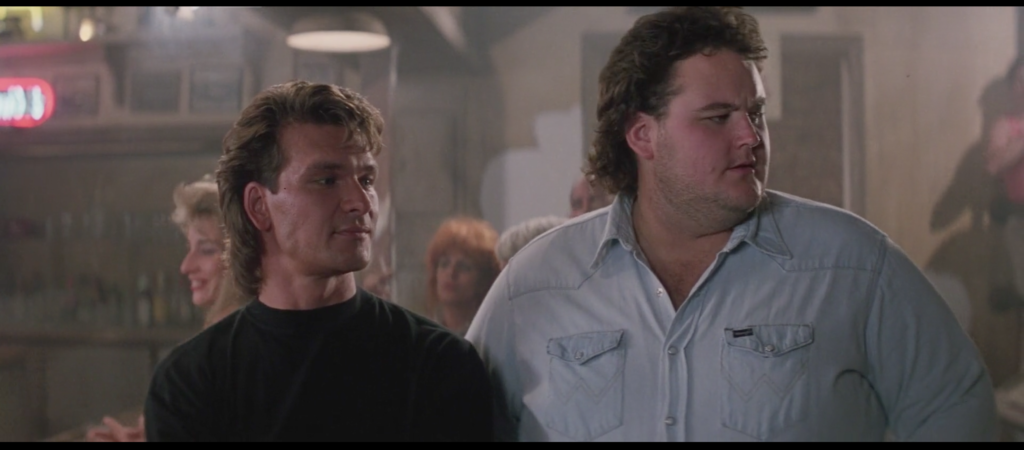
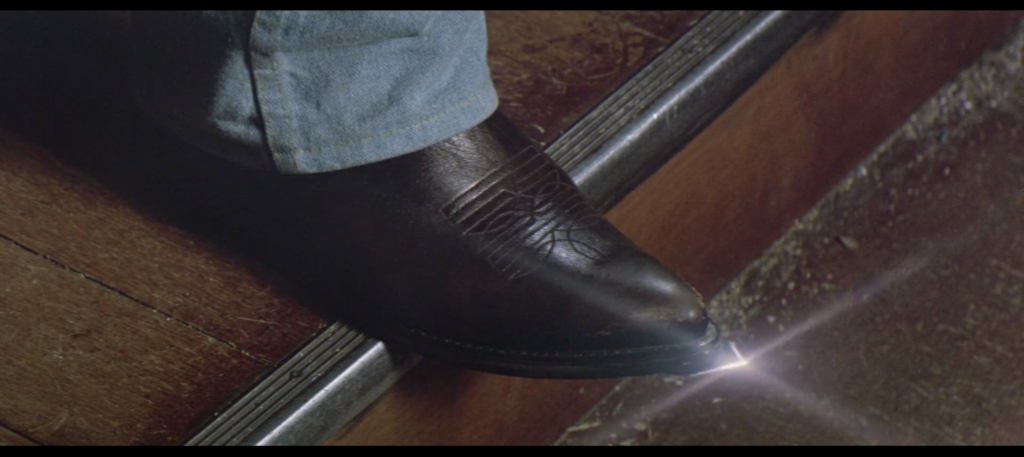
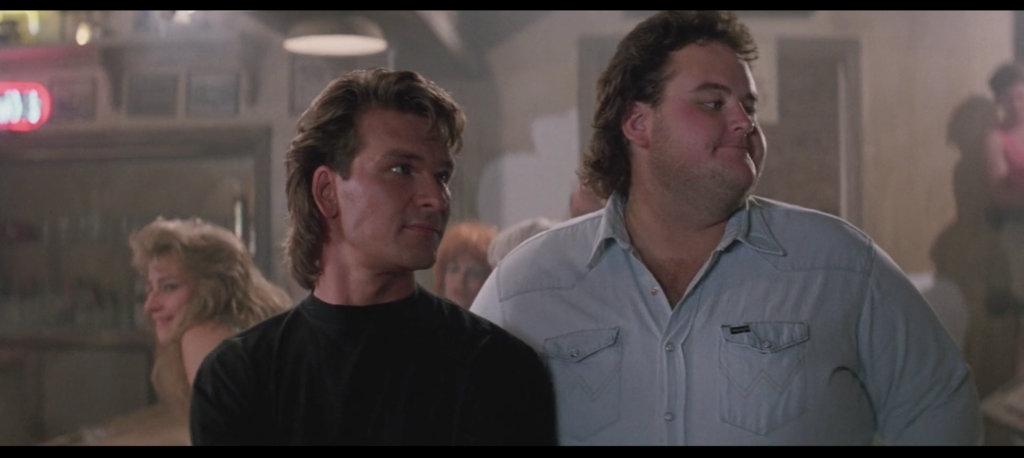
They added a gleam effect to the knife in the boot on the leg of the goon who tries to high-kick Dalton in the head with his knife-mounted boot. Just in case, you know. Even with the closeup—an eyeline match cut from Dalton and his Padawan learner Jack to the boot and then back again (Dalton: “Right boot.” [pause for boot] Jack: “Got it.”)—the audience could have missed it, primarily because even for the kinds of people who might want to watch Road House boot-mounted knives are not the kind of thing you’re trained to spot in the wild. Can’t be too careful, really.
No, really. Let’s review. Never underestimate your opponent. The opponent here is the audience’s inability to recognize a knife sticking out of a Knife Nerd’s shitkicker. Expect the unexpected. You wouldn’t expect someone to miss the knife when it’s one of three things on screen, the other two being the boot and the jeans covering the leg part of the boot, would you? Take it outside. Step beyond the boundaries of yourself and see things through the eyes of others. Never start anything inside the bar unless it’s absolutely necessary. The trouble here started when Brad Wesley, outside the bar, ordered this man to go inside for the express purpose of necessitating violence. Be nice. Dalton’s simply points out the location of the weapon to Jack rather than raising holy hell, a first move echoed when he amasses his bouncers, approaches the boot knife goon with a smile, and simply says the bar is closed. Until it’s time to not be nice. The arrival of the boot knife is the big hand reaching Not Nice O’Clock.
That gleam is not just the light reflected off some jackass’s dopey weapon. It’s Dalton’s bouncer-sense made visible.
033. Dead man
February 2, 2019When Dalton fires Morgan, the irascible bouncer played by pro wrestling legend Terry Funk, from the Double Deuce because he doesn’t have “the right temperament for the trade,” Morgan reacts as if determined to prove this was the right decision. “You asshole,” he growls. “What am I supposed to do?” “There’s always barber college,” Dalton deadpans in reply. The rest of the staff laugh at Morgan then, openly and for what I’d imagine is the first time. Dalton has defanged him.
Pointing his finger in Dalton’s face, Morgan delivers his farewell prediction: “You’re a dead man.” He nearly smacks his severance check out of Tilghman’s hand as he grabs it, then storms away.
Road House fans—Roadies—enjoy this interaction a great deal. It’s at least partially obvious why: How often do you get to see Patrick Swayze (Dirty Dancing) and Terry Funk (Halloween Havoc ‘89) tread the boards together? But it’s Funk’s innovative line readings that make this a standout scene.
He previews the direction he’s headed when he calls Dalton an asshole, which he pronounces “asshole,” emphasis very much on the second syllable and, one assumes, that particular aspect of the anatomy. Two nouns combined to elicit a prescribed response, right? For Morgan—and he’s not the only person in the film to pronounce the word in this way—”hole” is the lead noun, not “ass.” In his eyes, Dalton is less the cheeks than the evacuating void between.
Still, this might have escaped notice were it not for the coup de grace: not “You’re a dead man,” as every other person in the history of the English language has pronounced it, but “You’re a dead man.” Here, the rationale is a bit harder to parse. Surely no matter what spin you put on this, dead is the most important, and insulting, aspect of the phrase, right? Dalton already knows he’s a man. Dead is the newsworthy part. And in making himself the bearer of this bad news, Morgan is issuing a threat. (This is all obvious, I know, but we’re being methodical.)
So why emphasize “man”? Not to praise Dalton, that’s for sure, despite the rubric established by asshole. He’s putting man front and center in the Shakespearean, “What a piece of work is” way. If we think of Dalton as a man, a human, we imagine all that entails: his infancy, childhood, adolescence, young adulthood; his need to breathe, eat, drink, sleep, excrete; his social and biological drives to form community and find a mate; his hopes and fears and lusts; his prodigious skill and significant renown as a bouncer-philosopher; his future in all its possibility and inevitability. One pissed-off ex-coworker later and this could all be gone, a man reduced to meat and thence to nothing at all. In his own dimwitted way, from a brain that processes only rage and schadenfreude, Morgan is driving home what Dalton stands to lose, and what he plans to take away.
019. Staff
January 19, 2019Brad Wesley isn’t the only man in Jasper, Missouri with a goontourage. The employees of the Double Deuce whom Dalton does not fire when he assumes the role of cooler can generally be counted upon to have his back. I don’t think this is just the dubious whipped-dog loyalty of working stiffs to the middle manager who spares their jobs while shitcanning other people instead, either, though god knows we’ve all been there. Dalton brings out the best in good people and the worst in bad people. He’s a moral refinery. Here are the people who emerge purified from the kiln of his character. Most go unnamed, but let us not allow them to go unsung.
Jack
Bouncer. Expressive eyes. Quick on his feet, literally and figuratively. Played by Travis McKenna, whose body type sets him up as the opposite number to Brad Wesley goon standout Tinker, but never used as comic relief (except maybe once, when Brad Wesley goon standout Jimmy uses his prone body as a fulcrum to pole-vault onto the stage at the Double Deuce with a pool cue) and shows much higher levels of emotional intelligence. Fastest-moving character in the film save for Dalton himself. Visibly receptive to Dalton’s advice and instructions. Demonstratively appreciative of his fellow employees’ talents (he’s positively delighted to discover Carrie Ann’s singing voice). Frequently is the first to warn Dalton of Brad Wesley’s bad acts. Most likely to become the Dalton to Dalton’s Wade Garrett sometime down the line. Steve the Horny Bouncer whom Dalton fires due to his regular Saturday night thing calls him “Bear.” No one ever says this character’s name in the movie.
Younger
Bouncer. Just a big ol’ mumble-mouthed meathead, played by Roger Hewlett. Politely raises hand to ask a question during Dalton’s orientation session. Has the least screentime of the three bouncers, leaving the nature of his skill set largely to the imagination. The guy I would least like to tangle with personally, as he seems like he might not notice he’d beaten you to death until long after it was too late. No one ever says this character’s name in the movie.
Hank
Bouncer. The most visually dashing of Dalton’s crew, and the most openly fanboyish about his renowned exploits. Reenacts Dalton’s infamous throat-ripping maneuver, alerting us to this chapter in his checkered past. Frequently takes point in breaking up hostilities prior to Dalton stepping in. Smokes a lot. Played by future real-life murder-suicide perpetrator Kurt James Stefka, because every Lost Highway needs a fucking Robert Blake. No one ever says this character’s name in the movie.
Carrie Ann
Waitress. Singer. Breakfast delivery person. Engine of pure erotic power. Pal and confidante. Just a kickass character in every way. It helps that people do say her name in the movie, that’s for sure. Played by Kathleen Wilhoite and god bless her for it.
Stella
Waitress. Has that weird “German schoolgirl” vibe (description courtesy of MST3K/RiffTrax genius Mike Nelson) common to waitress types circa the filming of the original run of Twin Peaks, which you could probably convince anyone she was a character in as well. Tosses a bottle and hits a nitwit at one point. Played by Lauri Crossman. No one ever says this character’s name in the movie.
Ernie Bass
Bartender. Keith David. Unrealized potential. For some reason people say his name in the movie, though considering how badly he’s wasted who knows why.
The Nameless Bartender
Bartender. Prominent throughout the film. An original employee of the Double Deuce, unlike Ernie, who is brought in when things are flush. Multiple lines of dialogue. No one ever says this character’s name in the movie. No one ever bothered to name this character for the movie. Played by James McIntire, uncredited. There’s gotta be a story here, man.
Cody
Lead singer and guitarist of the Jeff Healey Band. Played by Jeff Healey. Not named Jeff Healey in the movie, though. Plays pretty good for a blind white boy, according to Dalton, with whom he has a long-standing working relationship. Possibly the person who recommended Dalton to Frank Tilghman, though this is never established and neither man seemed to realize the other would be working at the Double Deuce at the time of Dalton’s arrival. Adds much-needed verisimilitude and is a lot of fun to watch and listen to, even if acting is not Jeff Healey’s first calling. Recently I discovered that it’s Cody, not Dalton’s landlord Emmet, who sits on the shore as Dalton and the Doc skinny dip in that water at the end of the movie. They did seem pretty close, certainly.
Cody’s Drummer and Cody’s Bass Player
Drummer and bass player of the Jeff Healey Band. Played by Tom Stephen and Joe Rockman, who are amazingly not related despite both looking like they rolled off the dollar-store Eric Bogosian assembly line in the same batch. Silent observers of the events of the film, a mute Greek chorus. Great hair. No one ever says these characters’ names in the movie, not even “hey, Cody’s Drummer” or “Congrats on the chickenwire coming down, Cody’s Bass Player.”
???
??? That’s him on the left. I don’t know who this man is. This man is in a grand total of one scene, Dalton’s orientation session. This implies he’s an employee of the Double Deuce, but he is never seen before or since. No one ever says this character’s name in the movie. No one ever says his name outside of the movie. No record exists of the actor who played him. No evidence of his existence can be found anywhere beyond these few minutes of footage. Where he’s from the birds sing a pretty song, and there’s always music in the air. LET’S ROCK

